初中英语八大时态和三大从句之欧阳歌谷创作
初中常用词组之欧阳学文创作
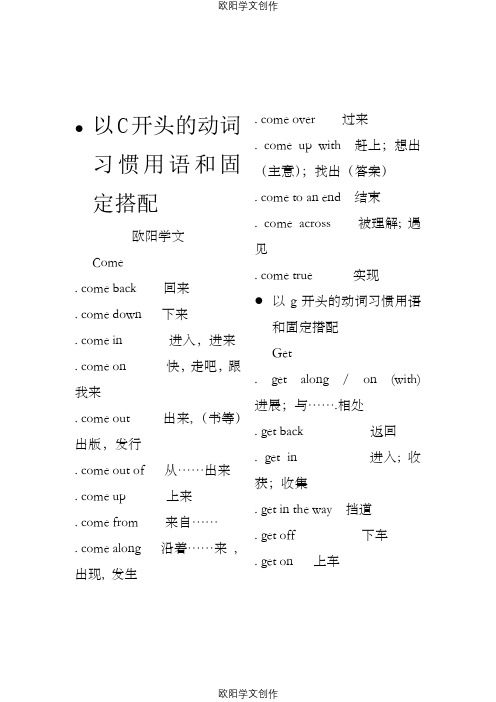
●以C开头的动词习惯用语和固定搭配欧阳学文Come. come back 回来. come down 下来. come in 进入,进来. come on 快,走吧,跟我来. come out 出来, (书等)出版,发行. come out of 从……出来. come up 上来. come from 来自……. come along 沿着……来, 出现, 发生. come over 过来. come up with 赶上;想出(主意);找出(答案). come to an end 结束. come across 被理解; 遇见. come true 实现●以g开头的动词习惯用语和固定搭配Get. get along / on (with) 进展;与…….相处. get back 返回. get in 进入; 收获;收集. get in the way 挡道. get off 下车. get on 上车. get into /out of car/ taix上/下车. get ready for 为……作准备. get married结婚. get tired of 对……感到厌倦. get to 到达. get together 相聚;联欢. get up 起床. get everything ready 把一切都准备好. get ready for =be ready for. 为……作好准备. get on (well) with与……相处(融洽). get sth from sp /get help from sb 从某人/某地得到某物. get rid of 除掉,去除;摆脱. get there 到达那里. get mad 变疯. get a chance to do 得到做某事的机会. get dressed 打扮Give. give in 屈服. give out 分发. give sb. a hand 助某人一臂之力. give up (doing sth.) 放弃(做某事). give a message to…… 给……一个口信. give sb. a chance 给……一次机会. give sb. a call给……打电话. give a talk 作报告. give a lecture (a piano concert) 作讲座(举行钢琴音乐会). give back=return 归还,送回. give……some advice on 给……一些忠告. give lessons to给……上课Go. go away 逃离; 离去. go for a swim 去游泳. go (out) for a walk (外出)去散步. go home 回家. go in for … 参加;从事于;酷爱. go wrong 出错. go off 响铃. go well 进展顺利. go bad 变糟糕. go down=sink 沉下. go abroad 出国. go after sb = follow sb跟着某人. go ahead 先走,向前走,去吧,干吧. go to the cinema 看电影. go to bed 睡觉. go to school (college) 上学(上大学). go to the hospital 去医院看病. go over /revise /do some revision 过一遍,复习. gofishing/skating/swimming/sho pping 去钩鱼/滑冰/游泳/买东. (the lights) go out (灯) 熄灭. go round 顺便去,绕道走. go up 走上前去. go upstairs/downstairs 上/下楼. go on doing 继续做…… . go on with one's work继续某人的工作. go on a picnic 去野餐. go on a diet 实行节食. go over 复习;仔细地再读一遍. go sightseeing 去观光. go to (the) hospital 去医院(看病). go to sleep 入睡以k开头的动词习惯用语和固定搭配. keep doing sth. 继续做某事. keep up with 跟上……,不落后于……. keep silent/quiet 保持沉默/安静. keep sb. doing sth.使……一直做……. keep one's diary 记日记. keep fit 保持健康. keep... from 使……不做. keep in touch (with) (与……)保持联系. keep off 阻挡;不让……接近. keep sb. busy 让某人忙个不停以L开头的动词习惯用语和固定搭配. look after 照料;照顾. look at 看;观看. look down upon 看不起;轻视. look for 寻找. look forward to doing sth 期待着做某事. look like 看上去象;显得. look out of 从……朝外看. look up 抬头看, 仰望. look the same 看起来一样. look on …as… 把……当作……看待. look over 仔细检查. look out 当心,小心. look at sb in surprise 惊奇的看着某人. look around 朝四周看. look up a word (in thedictionary. 查字典. look fine/well/tired/worried 看起来气色好/健康/疲劳/忧虑以m开头的动词习惯用语和固定搭配. make progress 进步. make money 赚钱. make the telephone call to sb / ring sb 打电话. make a decision 做决定. make one’s mind to do 下决心. make tea 沏茶. make sure that 确保. make jokes about sth 跟某人开玩笑. make a living 谋生. make sb. do sth. 迫使某人做……. make faces (a face. 做鬼脸. make friends with. 与……交朋友. make a mistake (mistakes) 犯错误. make room/space for 给……腾出地方. make a sentence (sentences. with 用……造句. make a fire 生火. make a film 拍电影. make a list of 制作清单. make the bed 铺床. make fun of 拿…开玩笑; 取笑…. make a noise (a lot of noise/much noise) /noises. 吵闹(十分嘈杂)/响声. make progress 取得进步. meet with 遭遇●以p开头的动词习惯用语和固定搭配. put out 熄灭; 伸出; 扑灭. put off 延期;推迟. put away 收起来. put sth together 把………放在一起. put up your hands /hands up 举手. put on 穿上(衣服. ,戴上(帽子. ,上演(戏剧.. put up 建造,搭起,挂起,举起,张帖. put into 使进入,输入. put one's heart into 全神贯注于. put…down… 把……放下, 推倒. put down 记下. put…into… 把……译成●以S开头的动词习惯用语和固定搭配Set. set up 竖起,建起. set off 出发,动身. set out 出发以t开头的动词习惯用语和固定搭配Take. take one's advice 听从某人劝告. take out 拿出,取出. take down 拿下. take place 发生. take one's place 坐……的座位,代替某人职务. take the place of 代替……. take a walk/rest 散步/休息. take it easy 别着急;别紧张. take sth.with sb. 随身带着. take sb. to some place for one's holidays 带某人去某处度假. take care of = look after 关心,照顾,保管. take a look (a last look) at =have a look at 看一看(最后看一眼). take an exam 参加考试. take away 拿走. take back 收回,带回欧阳学文创作. take hold of 抓住……. take off 起飞;脱下(衣,帽,鞋等. 拿掉. take (an active) part in (积极)参加……(活动). take photos 拍照. take some medicine 服药. take one’s time 从容;别紧张. take one’s tempera ture 量体温. take a bus/train/boat 乘公共汽车/火车/ 船. take up too much room 占据太多的空间. take care,/be careful /watch out/look out 小心. take care to do sth 小心做某事. take in 吸入. take sth from sth 从哪拿什么. take after 长的像某人,效仿某人Turn. turn off 关掉(电灯,电视收音机等). turn in 交出,上交. turn…into… 把……变成……. turn to 翻到,转向. turn down /up (把音量) 关小/开大;调低/高. turn…over 把……翻过来欧阳学文创作欧阳学文创作欧阳学文创作Atat breakfast /lunch /supper 在早/午/晚餐时at first 起先;开始的时候 at home 在家(里) at last 最后at least / most 至少/ 至多 at night/noon 在夜里/中午 at once 立刻 at present 现在, 目前 at school 在学校;在上课 at the age of… 在……岁时at the beginning of… 在……之初 at the end of… 在……之末 at the foot of… 在……脚下at the moment 此刻,目前; 那时,当时 at the same time 同时at the weekends / on weekends 在周末 at work 在工作 Up ) 向上lift up 举起 climb up 爬上 come up 上升 get up 起床 stand up 站起来 pick up 检起 grow up 长大 put up 举起 ;张贴 rise up 升起 look up 抬起头 take up 拿起 build up 树立 set up 建立 ) 完成,结束finish up 完成 drink up 喝干 eat up 吃光 burn up 烧光 wash up 洗净 use up 用光 fill up 装满 pay up 付清end up 结束close up 停止,关闭 break up 结束,分解 ) 离开,消灭break up 拆开,驱散 cut up 切碎blow up 炸毁 tear up 撕碎 give up 放弃 其他:speed up 加速 show up 显现 cheer up 振作起来 bring up 抚育 check up 核对 clear up 清理light up 点亮make up 化装, 和解, 弥补 take up 从事 shut up 关闭 block up 堵塞 cover up 掩盖 hold up 延误 keep up 坚持 Downgo down 下降,降低,被载入,传下去 run down 撞倒,撞沉,追捕,追查 take down 记下,写下 die down 渐渐消失,平息 let down 放下,降低,使失望 write down 写下,记下put down 记下,放下,镇压,平定 turn down (把音量)调低 cut down 砍倒fall down 倒下,跌倒set down 卸下,放下,记下,记入 get down 从……下来,写下 bring down 打倒,挫伤,降低 break down 损坏,分解,瓦解hand down 流传下来,传给,往下传 keep down 控制,压制,镇压,压低 pull down 拆毁,拉倒,拉下,降低 up and down 上上下下hand down to 往下传,传给(后代) pay down 即时交付,用现金支付 turn down ( 把音量)调低 blow down 吹倒 bend down 弯下 kneel down 跪下 copy down 抄下 note down 记下欧阳学文创作walk down ... 沿着...走jump down 跳下来keep the voice down 控制声音turn upside down 把倒置,弄得乱七八糟look down upon 瞧不起look ab. up and down 仔细打量某人get /have sth. down 做完,被(别人)做...Let sb. down 让某人失望get down to sth. 开始认真(做某事)go down / fall on one's knees 跪下sit down to table坐下吃饭Inbe absorbed in专心于be interested in 对... 感兴趣be located in 位于, 坐落于bear in mind 记住break in 闯入, 打断, 使驯服, 训练成为check in v.登记, 报到, 记录cut in 切入, 插嘴, 超车draw in (火车汽车)进站, 到达, 吸引drop in 顺便走访(某人)fall in love with 爱上...fill in v. 填写get in . 进入(到达, 收割, 收集, 当选)get in the way 阻碍, 妨碍give in 屈服, 让步, 呈交go in for 赞成, 参加, 从事, 爱好hand in 交上, 递交hand in hand 手拉手地, 联合起来, 相随have in mind 考虑到, 打算in a hurry 匆忙in a minute 一会儿let in 让 ... 进入, 放 ... 进来lie in 在于, 睡懒觉look in n. 看望, 成功的机会once in a while 偶尔, 有时pull in v. (交通工具)进站, 拉入, 逮捕put in . 插入, 提交, 任命, 实行, 花费(时间), 种植, 进入, 申请put in for 申请put in order 整理, 检修send in 呈报, 提出, 递送show in 领入sit in 旁听, 静坐抗议, 列席step in 走进, 介入, 干预, 伸脚穿入take delight in v. 以 ... 为乐take in .接受, 让…进入, 理解, 包括, 欺骗, 改短take part in 参加turn in 上缴, 拐入, 交还, 上床就寝out.look out 小心.watch out 小心.wear out 使疲劳;劳累.leave out 省去;遗漏;忽略.work out 解出,设计出.turn out 生产; 证明是.put out 扑灭;生产;出版;.take out 拿出.pull out 拉出;掏出; 拔出;抽出;取出;(车,船)驶出.pick out 选出;领会;弄明白.pay out 付出;得到报应.point out 指出.make out 看清;理解;断定.hand out 分发;施舍.go out (灯火)熄灭;(年月)结束.carry out (the plan / the policy) 实施;执行.break out 爆发.give out 发出(气味热)等;分发;耗尽;疲劳 .check out 结账离开. call out 大声叫喊.come out 出来;花开放;出版; 得…名次.get out (使)出去;逃脱;(消息等)泄露;说出;公布 .think out 想出.help out 帮助,帮助…出来;.find out发现; 使发作; 使受惩罚; 通过探询[访问]获悉(某人)不在;Onagree on 对…取得一致意见be based on 以…为基础;建立在…基础上be fixed on 被固定于call on 访问,拜访;号召,请求check on 检查;核实feed on 以...为食congratulate ...on 就…向某人表示祝贺depend on 取决于;依赖;依靠get ...on 穿上(衣服等);戴上(帽子等);盖上(盖子等):;开(灯开关等);放上;安上:hang on 坚持下去;不挂断;握住不放insist on 坚持,坚决要求;督促,强调jump on 跳上;扑向;责备land on 猛烈抨击;(飞机)降落于…look on 观看,旁观;看待operate on 对…动手术;对…起作用put ...on 穿上,戴上(衣帽眼镜等);增添,增加(体重肌肉速度等);加(若干数目)在价格(等)上rely on 依靠,依赖shine on发光;闪耀;照在…上come on快点;开始;要求;上演;跟着来;突然产生turn on 打开,发动go on 继续, 往前走, 发生spend ...on 在…上花费live on以...为食;靠...生活take on承担;呈现;具有;流行;接纳;雇用;穿上work on影响,对…起作用;继续工作;从事于…;设法说服concentrate on集中精力于;全神贯注于focus on集中于on one's way to 某人在去……的路上on foot 步行,走路a talk on space 一个关于太空的报告on the other hand 另一方面at/on the weekend 在周末on the left (right) 在左(右)边on the other side of 在……另一边on the radio 通过收音机(无线电广播)on time 按时on the other dand另一方面and so on 等等be on 上映, 上演carry on 继续进行come on v.突然产生, 要求, 降临, 开始, 进步快点,赶快depend on v.依赖, 依靠, 取决于, 随 ... 而定from now on 从现在起, 今后get on v. 上车, 有进展, 相处get on with 取得进展, 与 ... 友好相处, 继续做hold on vi.抓住, 继续, 坚持, 忍受,(打电话时用语)别挂断later on 后来, 过些时候live on 靠 ... 过活, 以 ... 为主食on hand 在手边, 在近处, 现有, 到场on show 展览, 陈列on the phone 在接电话中, 在电话里on time adv.准时on weekdays 平时, 在(所有)周日put on.穿上, 戴上turn on.打开, 发动,取决于, 使兴奋, 攻击offbadly off 贫困,贫穷better off 情况较好right off 立刻,马上(= straight off)well off 富裕worse off 情况较差be off离开take off[飞机等]起飞;脱下put off推延[时间]hurry off匆忙离开...turn off关掉...get off下车have /take/ask for a day off请假/离开一天fall off从...掉下give off发出[光热气味等]keep off让开,不接近awaytake away消除,消耗run away流失,逃跑give away泄露,分送get away逃脱,离开throw away扔掉put away把……收起来放好clear away扫除,收拾pass away去世,逝世far away很远,遥远far away (from)离)遥远far away from远离live far away from the school住在离学校很远的地方drive away (汽车)离开burn away燃烧没了take... away拿开,拿走give... away赠送;分发keep away from避开,不接近,离...远远的break away from打破,脱离,挣脱,改掉be away from 远离stay away from远离...smooth away difficulties克服困难get away with侥幸做成;侥幸得手give oneself away泄露,露马脚make away(急忙)离去;逃走make away with携...而逃;摧毁;浪费rub away擦掉;磨去run away with(感情等)战胜shoot away不停地射击weep away在哭泣中度过overall over到处run over 略读,略述,辗过,浏览,匆匆复习come over 过来,顺便拜访get over 克服, (从病中) 恢复过来go over 复习,仔细地再读一遍hand over 交出,移交,让与knock over 撞倒,撞翻over and over 再三,一遍又一遍take over 接管,接办think over 仔细考虑turn over 翻车,翻阅,翻身all over the world 全世界gain/have an advantage over 胜过,优于look over 检查,查看,调查over there 在那边all over the world/the country 全世界/全国over and over(again) 一再地,再三地move over to the table 到桌前就餐be all over 全场结束be over 结束get... over 克服;恢复;原谅across China = all over China 全中国push over 推倒,刮倒leave over 遗留,剩下,延期fall over one's feet 跌跤all over the world = the whole world 整个世界come over to 过来on the phone = over the phone 用电话交谈over and over agin 一遍又一遍的go over the lesson 复习功课。
英语中常用的连词之欧阳学文创作
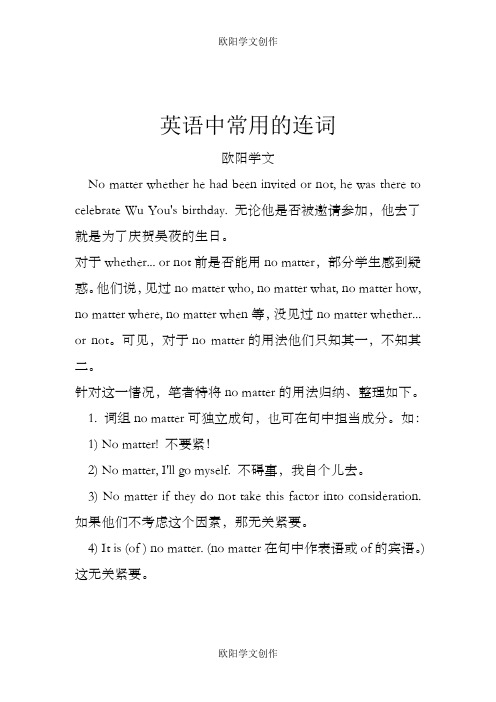
英语中常用的连词欧阳学文No matter whether he had been invited or not, he was there to celebrate Wu You's birthday. 无论他是否被邀请参加,他去了就是为了庆贺吴莜的生日。
对于whether... or not前是否能用no matter,部分学生感到疑惑。
他们说,见过no matter who, no matter what, no matter how, no matter where, no matter when等,没见过no matter whether... or not。
可见,对于no matter的用法他们只知其一,不知其二。
针对这一情况,笔者特将no matter的用法归纳、整理如下。
1. 词组no matter可独立成句,也可在句中担当成分。
如:1) No matter! 不要紧!2) No matter, I'll go myself. 不碍事,我自个儿去。
3) No matter if they do not take this factor into consideration. 如果他们不考虑这个因素,那无关紧要。
4) It is (of ) no matter. (no matter在句中作表语或of的宾语。
) 这无关紧要。
5) I had something to say, but it's no matter. 我本来有句话要说,但不是很重要。
2. 词组no matter在it作形式主语、真正主语位于句末的句子中作表语。
如:1) It is no matter that he didn't phone. 他没打电话没关系。
2) It made no matter to him that his brother lost all his money. 他哥哥把所有的钱都弄丢了,这对他来说是无关紧要的。
初中英语要掌握的词汇之欧阳歌谷创作

初中英语要掌握的词汇欧阳歌谷(2021.02.01)一、冠词(3个)1. a 一个(件/ 只……)2. an 一个(件/ 只……)3. the 这;这个;那;那个二.连词(24个)1. after 在……以后2. and 和;又3. as 像……一样;如同;因为4. because 因为5. before 在……之前6. but 但是7. if 如果;假使;是否;是不是8. neither 也不9. nor 也不10. or 或者;还是;否则11. since 从……以来;……以后12. that 既然;由于;(引导宾语从句等)13. though 虽然14. till 直到;直到……为止15. until 直到;直到……为止16. when 当……的时候17. whether 是否18. while 在/当……的时候;和……同时19. than 比20. so 因此;所以21. both…and…两个都;既……又……22. not only…but also… 不但……而且……23. either…or… 或者……或者……;不是……就是……24. neither…nor… 既不……也不……三.介词(37个)1. about 在各处;四处;关于2. after 在……之后;在……后面3. along 沿着; 顺着4. as 作为; 当作5. among 在……中间;在(三者或三者以上)之间6. at (表示地点/位置)在;(表示时间)在……时(刻) ;(表示动作的目标和方向)7. before 在……前面;在……以前8. behind 在……后面9. below 在……下面10. beside 在……旁边; 靠近11. between 在(两者) 之间; 在……中间12. by 在……旁边;靠近;在……时间;(指时间)不迟于;(用于被动语态) 被(表示方法、手段) 用; 由(指交通工具等) 乘;13. down 沿着( 街道、河流)而下14. during 在……的期间; 在……过程中15. except 除……之外16. for (表示方向) 往; (表示所属) ……的;(说明目的或用途) 为…17. from (表示起点) 从; (表示开始的时候) 从……起;(表示距离) 距; (表示来源) 来自18. in front of 在……前面19. into (表示动作的方向)到……内;(表示情况和结果的变化)变成20. in (表示位置)在…..里/内/中;在…(时间) 穿; 戴在…(情况/状况) 中;使用(语言)21. like 像22. near 在……附近; 靠近24. off (表示脱离)离开23. of (表示所属关系)…的;表示数量)…的;(表示其中)…的25. on 在……上面;在……时刻;关于26. over 在……上方(以上) ;越过;遍及27. past (指时间)过;走过某处28. since 自从…以来29. through 穿过,通过;从开始到结束30. till 直到……为止31. until 直到……为止32. up 在/ 向……上面33. to (表示方向) 到,向;(表示间接关系) 给;(表示钟点)在……之前34. with (表示具有) 带有; (表示手段或方法)用; (表示伴随)与…一道; 和…一起35. without 没有36. round 环绕一周; 围着37. under 在/ 向……下面四、代词人称代词我I / me 你you / you 他he / him 她she / her 它it / it 我们we / us 你们you / you 他/她/它们they / them 物主代词我的my / mine 你的your / yours 他的his / his 她的her / hers 它的its / its 我们的our / ours 你们的your / yours 他/她/它们的their / theirs 反身代词我自己myself 你自己yourself他自己himself 她自己herself 它自己itself 我们自己ourselves 你们自己yourselves 他/她/它们自己themselves复合不定代词something 某事;某物anything 什么事(物);任何事(物)nothing 没有东西everything 每件事;事事somebody (someone )某人;有人anybody (anyone )任何人nobody (no one )没有人everybody (everyone )每人;人人this 这;这个that 那;那个these 这些those 那些who 谁whom 谁whose 谁的what 什么which 哪个;哪些each other 互相;彼此one another 互相;彼此some 一些;若干any (无论)哪个;(无论)哪些many 许多人(或物) much 许多;大量both 两者;两人;双方neither 两者都不either 两者之一all 全部; 全体人员none 没有任何人或东西few 少数;不多little 少量,少许other 别人;别的东西another另一个each 每人;每个;每件one 指代人/物/事五、数词基数词1. one2. two3. three4. four5. five6. six7. seven 8. eight 9. nine 10. ten 11. eleven 12. twelve 13. thirteen 14. fourteen 15. fifteen 16. sixteen 17. seventeen18. eighteen 19. nineteen 20. twenty 30. thirty 40. forty 50. fifty 60. sixty70. seventy 80. eighty 90. ninety 100. a hundred 1,000. a thousand 1,000,000 a million 21. twenty-one 123. a hundred and twenty-three序数词第一first 第二second 第三third 第四fourth 第五fifth 第六sixth 第七seventh 第八eighth 第九ninth 第十tenth 第十一eleventh 第十二twelfth 第十三thirteenth 第十四fourteenth 第十五fifteenth 第十六sixteenth 第十七seventeenth 第十八eighteenth 第十九nineteenth 第二十twentieth 第三十thirtieth 第四十fortieth 第五十fiftieth第六十sixtieth 第七十seventieth 第八十eightieth 第九十ninetieth 第一百 a hundredth 第一千 a thousandth 第一百万 a millionth 第二十一twenty-first第一百二十三 a hundred and twenty-third 六.形容词(151个)1. able 能够;有能力的2.above 上面的3. afraid 害怕的;担心的4.alone 单独的5.all 全部;所有的6.angry 生气的;愤怒的7.another 再一;另一8.any 一些;任何的9.bad 坏的;严重的10.beautiful 美丽的11.big 大的12.black 黑色的13.blue 蓝色的14.both 两;双15.bright 明亮的;聪明的16.brown 棕(褐)色的17.busy 忙的;忙碌的18.careful 小心的;仔细的19.cheap 便宜的;贱20.clean 干净的;清洁的21.clear 清晰的;清楚的22.close 近的;靠近的23.cloudy 多云的24.cold 冷的;寒冷的25.cool 凉的;凉快的26.dangerous 危险的27.dark 黑暗的;深色的28.dead 死的29.dear 亲爱的;贵的30.deep 深的31.delicious 美味的;可口的32.different 不同的;差异的33.difficult 困难的;艰难的34.dirty 脏的35.dry 干的;干燥的36.early 早的37.east 东方的38.easy 容易的39.either (两者中)任何一方的40.empty 空的41.enough 足够的;充分的42.every 每一;每个的43.expensive 昂贵的44.famous 著名的45.far 远的46.fast 快的47.favourite 喜爱的;中意的48.few 不多的;少数的49.fine 晴朗的;(身体)很好50.first 第一;最初的51.foreign 外国的52.free 空闲的53.friendly 友好的54.front 前面的;前部的55.full 满的;饱的56.glad 高兴的;乐意的57.good 好;良好58.great 伟大的;重要的59.green 绿色的60.half 半;一半61.happy 高兴的;幸福的62.hard 困难的63.healthy 健康的;卫生的64.heavy 重的65.high 高的66.hot 热的67.hungry 饥饿的68.ill 生病的;不健康的69.important 重要的70.interested 感兴趣的;关心的71.interesting 有趣的72.kind 友好的;和善的73.large 大的;巨大的st 最后的;最近刚过去的75.late 迟的;晚的76.lazy 懒惰的77.left 左边的78.light 轻的;浅色的79.little 小的;少的80.long (距离)长的/远的81.loud 大声的;响亮的82.low 底的;矮的83.lucky 运气好的;侥幸的84.many 许多的85.modern 现代的86.much 许多的;大量的87.near 近的88.neither (两者)都不89.new 新的;新鲜的90.next (距离)最近的;紧挨的91.nice 美好的;令人愉快的92.no 没有93.north 北方的94.old 旧的;年老的95.only 唯一的;仅有的96.open 开着的;开口的97.orange 橙色的98.other 别的;另外的99.polite 有礼貌的100.poor 贫穷的101.popular 流行的102.possible 可能的;可能发生的103.quick 快的;迅速的104.quiet 安静的105.ready 准备好的106.red 红色的107.rich 富裕的;有钱的108.right 右边的;正确的109.round 圆的;球形的110.sad 悲伤的;使人悲伤的111.same 同样的112.second 第二113.serious 严重的;认真的114.several 几个;若干115.short 短的;矮的116.sick 生病的;有病的117.slow 慢的;缓慢的118.small 小的;少的119.some 一些;几个120.sorry 对不起的;难过的121.south 南方的122.strong (身体)强壮的123.such 这样的;那样的124.sure 肯定的;确定的125.sweet 甜的126.tall 高的127.terrible 可怕的;极不舒服的128.that 那;那个129.these 这些130.thin 瘦的;薄的131.thirsty 口渴的132.this 这;这个133.those 那些134.tired 疲劳的;累的135.true 真的;真实的136.useful 有用的;有益的137.usual 通常的;平常的138.warm 暖和的;温暖的139.weak 差的;弱的140.well 好的;健康的141.wet 湿的;潮的142.west 西方的143.what 多么;何等;什么144.which 哪一个;哪些145.white 白色的146.whole 整个的147.wide 宽的;宽阔的148.wonderful 极好的,精彩的149.wrong 错误的;不对的150.yellow 黄色的151.young 年轻的具有多种汉语意思的形容词:5.all 全;总;整全部;所有的7.another 再一;另一;别的;不同的18.careful 小心的;仔细的;谨慎的21.clear 清晰的;清楚的;明亮的27.dark 黑暗的;黑色的;深色的49.fine 晴朗的;美好的;(身体)很好52.free 空闲的;自由的;免费的55.full 满的;饱的;完全的62.hard 困难的;艰难的;硬的71.interesting 有趣的;有意思的;引人入胜的78.light轻的;浅色的;明亮的80.long (距离)长的/ 远的;(时间)长久的90.next (距离)最近的;紧挨的;隔壁的(时间)下一次94.old 旧的;古老的;年老的100.poor 贫穷的;可怜的;不好的101.popular 流行的;大众的;受欢迎的116.sick 生病的;有病的;呕吐;想呕吐119.some 一些;若干;几个122.strong (身体)强壮的;坚强的;坚固的;强有力的127.terrible 极坏的;可怕的;感到极不舒服的135.true 真的;真实的;真诚的138.warm 暖和的;温暖的;热情的;亲切的141.wet 湿的;潮的;多雨的143.what 多么;何等;什么七.副词(94个)1. about 大约;到处2. above 在上面3. after 在后;后来4. again 再一次;再;又5. ago 以前6. all 全部地7. almost 几乎;将近8. along 向前;和……一起9. already 已经10. also 也11. always 总是;永远12. around 在周围;在附近13. away 离开;远离14. back 向后;回原处15. before 以前16. behind 在后面;向后17. certainly 当然18. close 近;靠近19. deep 深地20. down 向下21. early 早地22. either 也(不)23. enough 足够地;充分地24. even 甚至;更25. ever 曾经;无论何时26. everywhere 到处27. far 远地28. fast 快地;迅速地29. first 最初30. hard 努力地;(下雨/ 下雪等)猛烈地31. hardly 几乎不32. here 这里;在这里;向这里33. home 回家;到家34. how 怎样;多少35. in 在家;在内;向内36. instead 代替;顶替37. just 正好;刚才;仅38. last 最后地;最近刚过去39. late 迟地;晚地40. later 之后;过后41. left 向左42. little 很少地43. long 长久44. loud 大声地;响亮地45. low 低;矮46. much 非常;更加47. near 附近;邻近48. neither 也不49. never 决不;从来不50. next 随后;下一步51. no 没有;不;无52. not 不;没53. now 现在54. off (电/ 自来水)停了55. often 经常56. on (穿/戴/放……)上57. once 从前58. only 只;仅仅59. out 离开;向外;在外60. outside 在外面61. over 结束;完了62. perhaps 可能;也许63. quick 快地;迅速地64. quite 完全;十分65. rather 相当;宁可66. really 真正地;确实67. right 正确地;恰恰68. since 从那时以来69. slow 慢地;缓慢地70. so 如此;很71. sometimes 有时72. soon 很快;不久73. still 仍然;还74. such 那么75. suddenly 突然76. then 那时;然后77. there 在(往)那儿;表示“存在” 78. through 自始至终79. today 今天;现在;当前80. together 一起81. tomorrow 明天82. tonight 今天晚上;今夜83. too 也;太84. twice 两次;两倍85. under 在下面;向下面86. up 向上;在上87. usually 通常;经常88. very 很;非常89. well 好90. when 什么时候91. where 在(往)哪里92. why 为什么93. yes 是;同意94. yet 还;仍然含有多种意思的副词:1. about 大约;到处;四处7. almost 几乎;将近;近乎8. along 向前;和…一起;一同17. certainly 一定;无疑地;是的;当然;好24. even 甚至;连……都;更34. how 怎样;如何;多少;多么37. just 正好;刚好;刚才;仅;不过40. later 之后;过后;不久50. next 随后;然后;下一步56. on (穿/戴/放……)上;(电灯/水管等)接通;(进行下去)/(继续下去)58. only 只;只是;仅仅;才59. out 离开;向外;在外67. right 正确地;恰恰;完全地70. so 那么;如此;非常;很76. then 当时;那时;然后;后来;接着;那么77. there 在那儿;往那儿;表示“存在” 78. through 穿过;通过自始至终;全部79. today 今天;现在;当前86. up 起立;起来;向上;在上89. well 好;完全地;充分地93. yes 是;好;同意94. yet 到目前为止;还;仍然八.动词(176个)1. agree 同意2. answer 回答;答复3. arrive 到达;达到4. ask 问;请求;要求5. be 是;成为6. beat 敲打;打胜;打赢7. become 变得;成为8. begin 开始;着手9. blow 吹;刮风;吹气10. borrow (向别人)借;借用11. break 打破;打断;打碎12. bring 带来;拿来13.brush 刷;擦14. buy 买;购买15. call 称呼;取名;叫喊16. can 能够;可以;可能17. care 关心;照料;照顾18. carry 运送;搬运;携带19. catch 捉住;赶上(车辆)20. change 改变;更换21. choose 挑选;选举22. clean 弄干净;擦干净23. close 关;闭24. come 来;来到25. cook 煮;烧;烹调26. cost 花费;值(多少钱)27. cover 覆盖;遮盖;掩盖28. cross 穿过;渡过29. cry 喊叫;哭31. dance 跳舞32. decide 决定;下决心33. die 死34. dig 挖(洞/沟等);掘35. do 做(事);干(事)36. draw 画;绘制37. drink 喝;饮38. drive 驾驶;驱赶39. eat 吃40. enjoy 欣赏;享有41. excuse 原谅;宽恕42. fail 失败;不及格43. fall 落下;下降44. feel 感觉;触;摸45. fill 满;充满46. find 找到;发现47. finish 结束;做完48. fish 钓鱼;捕鱼49. fly 飞;飞行50. follow 跟随;(表示时间/次序等)接着51. forget 忘记;忘掉52. get 变得;得到53. give 给;给予54. go 去;走55. grow 生长;种植56. hand 递;给;交付57. happen 发生58. have 有;吃;喝;进行59. hear 听见;听说60. help 帮助61. hold 拿;握住;举行62. hope 希望63. hurry 赶紧;匆忙64. hurt 伤害;伤痛65. invent 发明;创造66. join 连接;参加;加入67. jump 跳;跳跃68. keep 保持;保存69. kill 杀死;弄死70. knock 敲击;打71. know 知道;懂得72. last 持续73. laugh 笑;大笑;嘲笑74. lay 放;搁;生(蛋)75. learn 学习;学会76. leave 离开;剩下77. lend 借出;把……借给78. let 让79. lie 躺;卧;平放80. like 喜欢;喜爱;想要81. listen 听;仔细听;倾听82. live 居住;生活83. look 看;好像;显得84.love 爱;热爱;很喜欢85. make 做;制造86. matter 要紧;有关系(用于否定句和疑问句)87. may 可以;可能88. mean 意思是…;意味着… 89. meet 遇见;碰见90. mend 修理91. mind 关心;介意92. miss 错过;没看见93. move 移动;搬动94. must 必须;(表示猜测)一定是95. name 取名;命名96. need 需要;必需97. open 打开;张开98. own 拥有99. pass 经过;传递100. pay 付钱101. pick 拾起;采集102. plant 种植;播种103. play 玩;打(球)104. please 请105. post 邮寄106. practise 练习;实践107. pull 拉;拖108. push 推109. put 放;摆110. rain 下雨111. reach 到达;抵达112. read 读;朗读113. receive 收到;得到114. remember 记得;想起115. report 报告;报道116. ride 骑(马/自行车等);乘车旅行117. ring (钟/铃等)响;给…打电话118. run 跑;奔跑119. save 救;挽救120. say 说;讲121. see 看;拜访;看望122. seem 好像;似乎123. sell 卖;销售124. send 派遣;送125. set 建立;创立126. shall 将;要;会127. shine 照耀;发光;发亮128. shop 到商店买东西129. shout 喊;高声呼喊130. show 给……看;出示131. sing 唱;唱歌132. sit 坐133. sleep 睡觉134. smell 嗅;闻;散发气味135. smile 微笑136. snow下雪137. sound 听起来;似乎138. speak 说话;讲话139. spend 花费(时间/金钱等);度过140. stand 站;立141. start 开始;出发142. stay 停留;暂住143. step 走;跨步144. stop 使停止;阻止145. study 学习;研究146. surprise 使惊奇;使诧异147. swim 游;游泳148. take 拿;带去;花费149. talk 说话;交谈150. teach 教;教书151. telephone 打电话152. tell 告诉;讲述153. thank 谢;感谢154. think想;认为155. throw 投;掷;扔156. travel(长途)旅行157. try 试;努力158. turn转动;转变159. understand懂得;理解160. use利用;使用161. visit参观;访问;拜访162. wait等;等候163. wake醒;醒来164. walk 走;散步165. want 想要;需要166. wash 洗167. watch 观看;注视168. water 给……浇水169. wear 穿;戴170. welcome 欢迎171. will 将;会;要172. win 获胜;赢得173. wish 希望;想要174.work 工作;运转175. worry 烦恼;担心176. write 书写;写下含有多种意思的动词:2. answer 回答;答复;回信9. blow 吹;刮风;吹气10. borrow (向别人)借;借用11. break 打破;打断;打碎16. can 能够;可以可能;会17. care 关心;照料;照顾18. carry 运送;搬运;携带27. cover 覆盖;遮盖;掩盖28. cross 穿过;越过;渡过30. cut 切;剪;削;割36. draw 画;绘制拉;拖43. fall 落下;下降;倒下;跌倒46. find 找到;发现;发觉;感到49. fly 飞;飞行;乘飞机旅行53. give 给;递给;给予;付出54. go 去;走;驶通到;达到55. grow 生长;发育;种植;渐渐变得56. hand 递;给;交付58. have 有;吃;喝;进行;经受59. hear 听见;听说;得知61. hold 拿;抱;握住举行;进行71. know 知道;懂得;认识;了解76. leave 离开;剩下;把……留下82. live 居住;生活;活着;生存85. make 做;制造;使得92. miss 错过;没看见;想念;惦记93. move 移动;搬动;搬家99. pass 经过;路过;传递;通过100. pay 付钱;发工资;给……报酬103. play 玩;做(游戏);打(球)104. please 请;使人高兴;使人满意115. report 报告;报道;汇报124. send 打发;派遣;送;寄出130. show 给……看;出示;显示;显出134. smell 嗅;闻;散发气味138. speak 说话;讲话说/讲(某种语言)141. start 开始;着手;出发142. stay 停留;暂住;逗留;呆152. tell 告诉;讲述;吩咐154. think 想;思考;认为;考虑157. try 试;试图;努力158. turn 旋转;转动;翻转;转变159. understand 懂得;理解;明白160. use 利用;使用;应用161. visit 参观;访问;拜访164. walk 走;步行;散步165. want 要;想要;需要;必需173. wish 希望;想要祝愿;愿174. work 工作;干活;运转;转动175. worry 烦恼;担心;发怒困扰;烦人176. write 书写;写下写信写作;著述 6. beat 敲打;(脉/心脏)跳动打胜;打赢15. call 称呼;取名;呼唤;叫来;大声说;叫喊19. catch 接住;捉住;赶上(车辆);患(传染病等)52. get 变得;成为;得到;收到;(用于have got 短语中)具有;到达68. keep 保持;保存;保持(某种状态);继续不断121. see 看;理解;领会;拜访;看望;会见125. set 建立;创立;释放;(日/月等)落126. shall 将;要;会;(用来征求意见)……好吗127. shine 照耀;发光;发亮;使发光;使发亮171. will 将;会;(表示同意、允诺)愿意;要(客气提问)是否愿意;……好吗九.名词(上)1. accident 事故;意外的事2. address 住址;通讯处3. afternoon 下午4. air 空气;大气5. all 全部;全体人员6. animal 动物7. answer 答案8. apple 苹果9. arm 胳臂10. art 术11. aunt 婶母;伯母12. autumn 秋天;秋季13. back 背;背后14. bag 书包;袋子15. ball 球16. banana 香蕉17. basket 篮子18. basketball 篮球;篮球运动19. bed 床20. bedroom 卧室21. bell 钟;铃22. best 最好的人或物23. bike 自行车24. bill 帐单;清单25. bird 鸟26. birthday 生日27. bit 一点;一些28. black 黑色29. blackboard 黑板30. blue 蓝色31. boat 小船32. body 身体;躯体33. book 书;本子34. bookshop 书店35. bottle 瓶子36. box 箱子;盒子37. boy 男孩38. bread 面包39. breakfast 早餐40. bridge 桥41. brother 兄弟42. brown 棕色;褐色43. brush 刷子44. building 建筑物;房屋45. business 商业;生意46. bus 公共汽车47. cake 蛋糕48. call (一次)电话49. car 小汽车50. card 卡片;名片51. care 小心;照料52. cat 猫53. center 中心;中央54. chair 椅子55. change 变化;零钱56. child 孩子;儿童57. Christmas 圣诞节58. cinema 电影;电影院59. city 城市60. class 班;课61. classmate 同班同学62.classroom 教室63. clock 钟64. clothes 衣服65. coat 上衣;外套66. cold 寒冷;感冒/着凉67. colour 颜色68. comrade 同志69. computer 电脑;电子计算机70. cook 厨师;炊事员71. copy (书/报等的)一本/份/册…… 72. corner 角落;拐角73. cotton 棉花74. country 国家;农村75. course 过程;经过76. cover 盖子;罩77. cow 奶牛;母牛78. cross 十字形;交叉79. cry 叫喊;哭声80. cup 杯;杯子81. dad 爸爸82. dance 跳舞83. dark 黑暗;深色84. date 日期85. daughter 女儿86. day 天;日87. desk 书桌88. dictionary 字典;词典89. dinner 正餐90. doctor 医生91. dog 狗92. dollar 元(美/加拿大)93. door 门94. dress 服装;女装95. drink 饮料;喝酒96. driver 司机;驾驶员97. duck 鸭子98. dumpling 饺子99. ear 耳朵100. earth 地球101. east 东;东方102. egg 蛋;卵103. end 末尾;终点104. enough 足够;充足105. evening 晚上;傍晚106.exam 考试;测试107. excuse 借口;辩解108. exercise 做操;练习109. eye 眼睛110. face 脸;面孔111. factory 工厂112. family 家庭113. fan 爱好者; (114)farm 农场;农庄115. farmer 农民116. father 父亲117. favourite 特别喜爱的人或物118. field 田地;场地119. film 电影;影片120. fire 火;火灾121. first 开始;开端122. fish 鱼;鱼肉123. floor 地板;(楼房的)层124. flower 花125. food 食物;食品126. foot 脚/ 足;英尺127. football 足球128. foreigner 外国人129. friend 朋友130. fridge 电冰箱131. front 前面;前部132. fruit 水果133. fun 有趣的事;娱乐134. future 将来;未来135. game 游戏;比赛136. garden 花园137. girl 女孩138. glass 玻璃;玻璃杯139. grade 等级;(中、小学的)学年140. grandfather 祖父;外祖父141. grandpa 爷爷;外公142. grandmother 祖母;外祖母143. grandma 奶奶;外婆144. grass 草;牧草145. green 绿色146. ground 地面;运动场147. group 群;小组148. hair 头发149. half 半;一半150.hand 手;(钟/表的)指针151. head 头;头部152. heart 心;心脏153. help 帮助154. hill 小山155. history 历史156. hole 洞157. holiday 假日;节日158. home 家159. homework 家庭作业160. hope 希望161. horse 马162. hospital 医院163. hotel 旅馆164. hour 小时165. house 房子166. hurry 赶紧;急忙167. husband 丈夫168. ice 冰169. idea 主意;想法170. interest 兴趣;趣味171. jacket 短上衣;外套172. key 钥匙;答案173. kilometer 千米;公里174. kind 种;类175. knife 小刀176. lady 女士;夫人177. lake 湖178. land 陆地;土地179. language 语言180. last 最后181. laugh 笑;嘲笑182. league 联盟183. left 左边184. leg 腿185. lesson 课;功课186. letter 字母;信187. library 图书馆188. life 生命;生活189. light 光;灯190. line 线;生产(装配)线九.名词(中)191. list 清单;名单192. little 没有多少;一点193. lot 很多194. love爱195. lunch 午餐196. machine 机器197. madam 女士;夫人;小姐198. man (成年)男人199. map 地图200. market 市场;集市201. match 比赛202. maths 数学203. matter 事情;问题(与the连用204. meal 一餐(饭)205. meat 肉206. medicine (内服)药207. meeting 会;聚会208. member 成员;会员209. metre 米;公尺210. middle 中间;当中211. milk 牛奶212. mind 思想;想法213. minute 分(钟);一会儿/ 瞬间214. Miss 小姐215. mistake 错误216. moment 一会儿;片刻217. money 钱;货币218. monkey 猴子219. month 月220. moon 月亮221. morning 早上;上午222. most 大部分;大多数223. mother 母亲224. mountain 山;山脉225. mouth 嘴226. Mr 先生227. Mrs 夫人228. much 许多;大量229. museum 博物馆230. music 音乐231. name 名字;姓名232. need 需要;必需233. news 新闻;消息234. newspaper 报纸235. night 夜晚;黑夜236. nobody 没有人237. noise 响声;噪声238. noon 中午239. north 北;北方240. nose 鼻子241. number 数字;号码242. nurse 护士243. o’clock ……点钟244. office 办公室245. once 一次;从前246. orange 橙子;柑子247. page 页;页码248. pair 一对;一副249. paper 纸;报纸250. pardon 原谅251. parent 父(母)亲252. park 公园253. part 部分254. party 聚会;党派255. past 过去;往事256. pay 工资257. pear 梨258. pen 钢笔259. pencil 铅笔260. people 人;人们261. person 人262. photo 照片263. picnic 野餐264. picture 照片;图画265. piece 一块/片/张/件…266. pioneer 先锋;开拓者267. place 地方;地点268. plane 飞机269. plant 植物270. plate 碟子;盘子271. play 玩耍;戏剧272. police 警察;警察当局273. post 邮寄;邮政274. potato 土豆;马铃薯275. present 礼物276. problem 问题;难题277. programme 节目;项目278. pupil 学生279. push 推280.quarter 一刻钟;四分之一281. question 问题282. race 赛跑;竞赛283. radio 收音机;无线电284. rain 雨;下雨285. red 红色286. report 报告;报道287. rest 休息;其余288. rice 大米;米饭289. right 右边;正确290. ring 打电话291. river 江;河292. road 道路;公路293. room 房间;室294. school 学校295. science 科学296. sea 海;海洋297. season 季;季节298. seat 座位299. second 秒;第二个人或物300. set 设备;(一)套301. sheep 羊;绵羊302. ship 船;轮船303. shirt (男式)衬衫304. shoe 鞋305. shop 商店;店铺306. shout 喊;高声呼喊307. side 边;面308. sir 先生309. sister 姐妹310. size 尺寸;大小311. skirt (女)短裙312. sky 天空;天313. sleep 睡觉314. smell 味;气味315. smile 微笑316. snow 雪317. soldier 士兵318. son 儿子319. song 歌唱;歌曲320. sound 声音321. south 南;南方322. sport 运动;运动会323. spring 春天;春季324. stamp 邮票325. star 星; 恒星326. station (火车/汽车等)站;电台327. stay 停留;逗留328. step 脚步;脚步声329. stick 木棒;木棍330. stop 停止;车站331. story 故事;小说332. street 街;街道333. student 学生334. study 学习;研究335. subject 科目;(语法)主语336. sugar 糖337. summer 夏天;夏季338. sun 太阳;阳光339. supper 晚餐340. surprise 惊奇;诧异341. sweet 糖果342. swim 游;游泳343. table 桌子344. talk 谈话;讲话345. tea 茶;茶叶346. teacher 教师347. team 队;组348. telephone 电话349. temperature 温度350. term 学期351. thank 感谢;谢谢352. thing 事情;东西353. ticket 票;券354. time 时间;次355. today 今天356. tomorrow 明天357. tooth 牙齿358. top 顶部;(物体的)上面359. town 城镇;镇360. train 火车361. travel (长途)旅行362. tree 树363. trouble 烦恼;麻烦364. TV 电视365. uncle叔父;伯父366. vegetable 蔬菜367. village 村庄;乡村368. visitor 参观者;访问者369. walk 走;散步370. wall 墙371. watch 手表;怀表372. water 水373. way 道路;方法374. weather 天气375. week 周;星期376. welcome 欢迎377. west 西;西方378. while 一会儿;一段时间379. white 白色380. wife 妻子381. wind 风382. window 窗383. winter 冬天;冬季384. wish 愿望;祝愿385. woman 妇女;女人386. word 词;单词387. work 工作;劳动388. worker 工人;工作者389. world 世界390. year 年391. yellow 黄色392. yesterday 昨天393. zero 零394. zoo 动物园。
过去将来时之欧阳歌谷创作
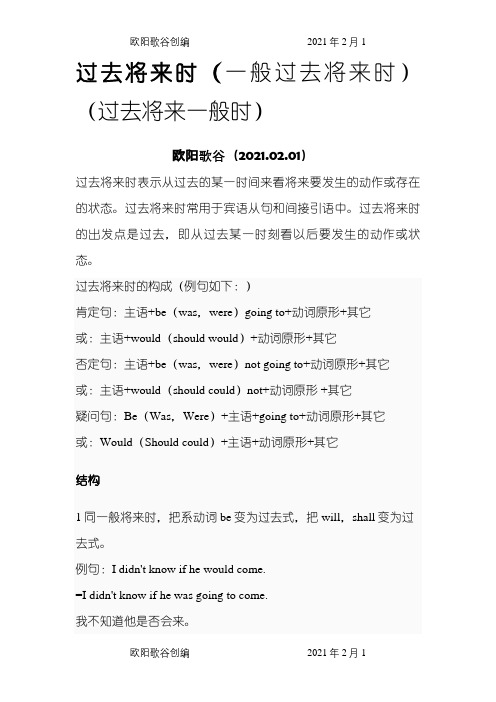
过去将来时(一般过去将来时)(过去将来一般时)欧阳歌谷(2021.02.01)过去将来时表示从过去的某一时间来看将来要发生的动作或存在的状态。
过去将来时常用于宾语从句和间接引语中。
过去将来时的出发点是过去,即从过去某一时刻看以后要发生的动作或状态。
过去将来时的构成(例句如下:)肯定句:主语+be(was,were)going to+动词原形+其它或:主语+would(should would)+动词原形+其它否定句:主语+be(was,were)not going to+动词原形+其它或:主语+would(should could)not+动词原形 +其它疑问句:Be(Was,Were)+主语+going to+动词原形+其它或:Would(Should could)+主语+动词原形+其它结构1同一般将来时,把系动词be变为过去式,把will,shall变为过去式。
例句:I didn't know if he would come.=I didn't know if he was going to come.我不知道他是否会来。
She was sixty-six. In three years,she would be sixty-nine.她66岁了。
三年后,她是69岁。
She told us that she would not go with us,if it rained.她告诉我们,如果下雨,她就不和我们一起去了。
I didn't know how to do it. What would be their ideas?我不知如何去做,他们会有什么想法呢?2.过去将来时常可用来表示过去习惯性的动作。
此时,不管什么人称,一律用would。
过去将来时有时可带时间状语注意1"was/were going to + 动词原形"或"was/were +动词不定式完成式"可表示未能实现的过去将来时间的动作。
新概念英语第3册语法之欧阳歌谷创作
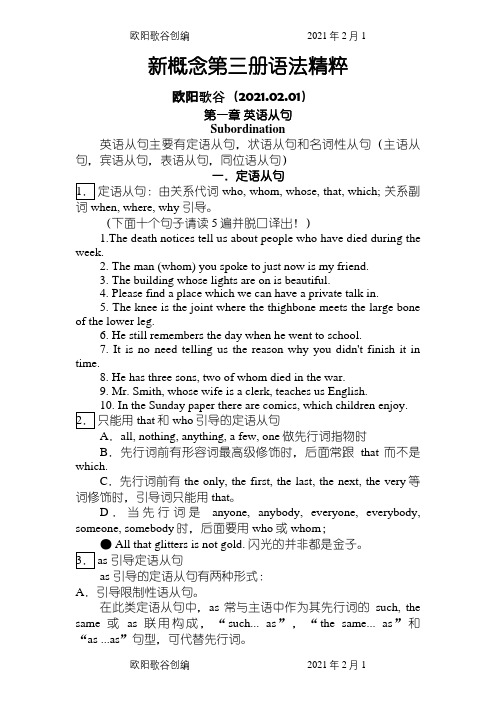
新概念第三册语法精粹欧阳歌谷(2021.02.01)第一章英语从句Subordination英语从句主要有定语从句,状语从句和名词性从句(主语从句,宾语从句,表语从句,同位语从句)一.定语从句定语从句:由关系代词 who, whom, whose, that, which; 关系副词 when, where, why 引导。
(下面十个句子请读 5遍并脱口译出!)1.The death notices tell us about people who have died during the week.2. The man (whom) you spoke to just now is my friend.3. The building whose lights are on is beautiful.4. Please find a place which we can have a private talk in.5. The knee is the joint where the thighbone meets the large bone of the lower leg.6. He still remembers the day when he went to school.7. It is no need telling us the reason why you didn't finish it in time.8. He has three sons, two of whom died in the war.9. Mr. Smith, whose wife is a clerk, teaches us English.10. In the Sunday paper there are comics, which children enjoy.只能用that和who引导的定语从句A.all, nothing, anything, a few, one做先行词指物时B.先行词前有形容词最高级修饰时,后面常跟that而不是which.C.先行词前有 the only, the first, the last, the next, the very等词修饰时,引导词只能用that。
时间状语从句讲解之欧阳治创编

概念:在复合句中,由时间连接词引导的状语从句叫做时间状语从句。
(在复合句中,要注意主句和从句的时态大多都要保持一致。
)1.由when, while, as,after,before,since,untill,引导的时间状语从句。
例如:When you think you know nothing, then you begin to know something.当你以为自己一无所知的时候,你就是在开始知道一些事物了。
When truth is buried under the ground it grows, it chokes, it gathers such an explosive force that on the day it bursts out , it blows up everything with it.当真理被埋在地下的时候,它在生长,它感到压抑,它蓄存着这么一种爆炸性力量,一旦冒出,它就会炸破一切!Strike while the iron is hot. 趁热打铁。
You can feel the air moving as your hand pushes through it. 当你的手在空气中挥动的时候,你就能感觉到空气在流动。
Our headmaster laughed as she spoke.我们的校长边谈边笑。
主要时态:主过从过;主将从现;主句为一般现在时,从句不受影响。
编辑本段when, while和as的区别when引导的从句的谓语动词可以是延续性的动词,又可以是瞬时动词。
并且when有时表示“就在那时”。
例如:When she came in, I stopped eating.她进来时,我停止吃饭。
(瞬时动词)When I lived in the countryside, I used to carry some water for him.当我住在农村时,我常常为他担水。
八种时态表格之欧阳语创编

on Mondays, etc.
1.be动词
2.行为动词
主语+be+其他
1.把动词be放于句首。
2.用助动词do提问,如主语为第三人称单数,则用does,同时还原为动词原形。
am/is/are+not
2.此时态的谓语动词若为行为动词,则在其前加don’t;若主语为第三人称单数,则用doesn’t,同时还原行为动词。
英语八大时态总结(表格)
时间:2021.03.01
创作:欧阳语
下面用表格的形式给大家罗列出来,便于大家记忆
定义
时间状语
结构
一般疑问句
否定句形式
1、一般现在时
经常、反复发生的动作或行为及现在的某种状况。
often, usually, always, sometimes, every
day(week,month),
时间:2021.03.01
创作:欧阳语
主语+am/ is/ are +not +doing
6、将来进行时
强调在将来的某个具体时间正在发生的动作或事情
Tomorrow,
at that time
will be + doing
把be动词放在句首
will be + not+ doing
7、现在完成时
过去发生或已经完成的动作对现在造成的一向或结果,或从过去已经开始,持续到现在的动作或状态。
1.be going to +do2.will /shall+do
1.be放在句首。2.will/shall提到句首。
1.be going to+not+ do
英语各时态标志词之欧阳学文创作

英语各时态标志词欧阳学文一般现在时:always, usually, often ,sometimes有时never从未, seldom很少(否定词)everyday/week/month/year/morning/evening/nighteachday/week/month/year/morning/evening/night每天/周/月/年/早上/傍晚/夜once a week每周一次, twice a month每月两次, three times a year一年三次一般过去时:yesterday, the day before yesterday前天, two days ago两天前last day/night/week/month/year 昨天/夜;上周/月;去年in 1990在1990年, just now刚才, at the age of five五岁时once upon a time曾经long time ago, long long ago很久以前one day有一天;then那时;on that day那天现在进行时:look, listen 看/听!now现在, at this time, at this moment此刻过去进行时:this time yesterday昨天的此刻;at that time那时at six o’clock yesterday morning昨天早上六点钟的时候from three to five yesterday afternoon 昨天下午3点到5点the whole morning整个早上一般将来时:tomorrow,the day after tomorrow后天,soon不久in a few minutes几分钟后,in an hour一小时后, in two days两天后next day/week/month/yearin the future将来,in future今后过去将来时:欠奉现在完成时:already“已经”用于肯定句, yet“已经”用于否定句和疑问句never从不, ever曾经, just刚刚,before以前,recently最近, lately最近for+段时间,since+点时间so far到目前为止, up to now到现在为止, ever since自从in the past three years在过去的三年;in the last two weeks在过去的两星期过去完成时:by the end of last year/month/week/term到去年年底时;到上个月/周/学期末时。
初中英语八大时态和三大从句之欧阳与创编
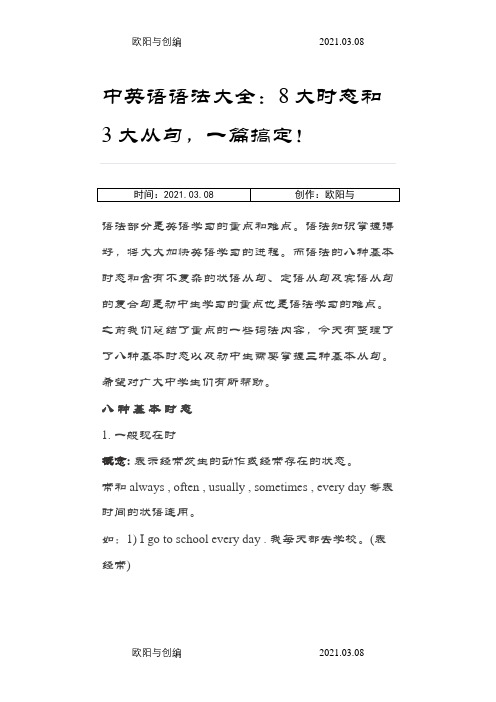
中英语语法大全:8大时态和语法部分是英语学习的重点和难点。
语法知识掌握得好,将大大加快英语学习的进程。
而语法的八种基本时态和含有不复杂的状语从句、定语从句及宾语从句的复合句是初中生学习的重点也是语法学习的难点。
之前我们总结了重点的一些词法内容,今天有整理了了八种基本时态以及初中生需要掌握三种基本从句。
希望对广大中学生们有所帮助。
八种基本时态1. 一般现在时概念:表示经常发生的动作或经常存在的状态。
常和 always , often , usually , sometimes , every day 等表时间的状语连用。
如:1) I go to school every day . 我每天都去学校。
(表经常)2) He is always like that . 他总是那样。
(表状态)构成:1) 主语+ be (am / are / is ) +……2) 主语 + 实义动词/三单动词+ …2.一般过去时概念:1) 表示过去某个时间发生的动作或存在的状态.常和表示过去的时间状语连用. 如: yesterday , last week , in 1998 , two days ago等.如: I went to a movie yesterday. 我昨天去看了一场电影.2) 也可表示过去经常或反复发生的动作.如 He always went to work by bike last week.构成:1) 主语+ be (was / were ) +……2) 主语 + 实义动词过去式 +3. 现在进行时概念: 表示现在(说话瞬间)正在进行或发生的动作. 如: He is singing.They are watching TV now.构成:主语 + 助动词be(am/are/is) + 动词-ing形式构成.4. 过去进行时概念: 表示过去某一时刻或某一段时间正在进行的动作. 这一特定的过去时间除了有上下文暗示外,一般用时间状语来表示.如: 1) ---What were you doing?---I was jumping.2) ---What was the boy doing when the UFO arrived?---He was sleeping.构成:主语 + 助动词be(was/were) + 动词-ing形式构成.5. 一般将来时概念: 表示将来某个时间要发生的动作或存在的状态,也表示将来经常或反复发生的动作,常与表示将来的时间状语连用,如: tomorrow, next week, next year, in the future等.如: He will go shopping tomorrow.They are going to play basketball next week.构成:1) 主语 + 助动词will + 动原+…2) 主语 + be going to + 动原+ ….6. 过去将来时概念: 表示在过去将来的某一时间发生的动作或存在的状态.构成:1) 主语(第一人称) + 助动词should + 动原+…2) 主语 + would + 动原+ ….3) 主语 + was/ were going to +动原…用法:过去将来时除了上下文暗示外,一般常用在间接引语中,主句谓语动词为过去时态.如: 1) I should go.2) You knew I would come.3) They were going to Naning.7. 现在完成时构成: 主语 + 助动词 ( have / has ) + 动词过去分词+…表示过去发生或已经完成的动作对现在造成的影响或结果.---Have you had your lunch yet?---Yes, I have. (现在我不饿了)8. 过去完成时构成:主语 + 助动词 had + 动词过去分词+…表示过去在过去某一时间或动作之前已经发生或完成了的动作.它表示的动作发生的时间是”过去的过去”.表示过去某一时间可用by, before 等构成的短语,也可用when, before, 等引导的从句或者通过上下文表示.I had finished my homework when my mom came back home.三种基本从句从句的共同特点从句是指在一个句子中充当一个成分的句子,充当什么成分就叫什么从句,如:充当宾语就叫宾语从句,充当定语成分就叫定语从句。
十大从句类型之欧阳音创编
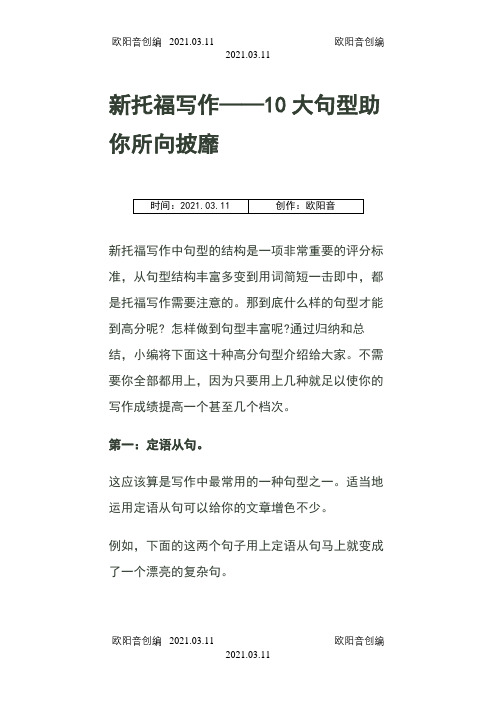
新托福写作——10大句型助你所向披靡新托福写作中句型的结构是一项非常重要的评分标准,从句型结构丰富多变到用词简短一击即中,都是托福写作需要注意的。
那到底什么样的句型才能到高分呢? 怎样做到句型丰富呢?通过归纳和总结,小编将下面这十种高分句型介绍给大家。
不需要你全部都用上,因为只要用上几种就足以使你的写作成绩提高一个甚至几个档次。
第一:定语从句。
这应该算是写作中最常用的一种句型之一。
适当地运用定语从句可以给你的文章增色不少。
例如,下面的这两个句子用上定语从句马上就变成了一个漂亮的复杂句。
Bad books contain evil thoughts. In them, there might be much description about violence, superstition, and sex.→ Bad books, in which there might be much description about violence, superstition, and sex, contain evil thoughts.第二:状语从句。
在写作当中运用的最多的是以下五种状语从句,即原因状语从句,让步状语从句,条件状语从句,时间状语从句和目的状语从句。
1. 原因状语从句:常由because, as, since和for引导Eg: Nonetheless, I am still in favor of space travel, for its merits far outweigh demerits.尽管如此,我还是赞成太空探险,因为它的好处远远大于坏处。
2. 让步状语从句:常由although, though, even though/ if, as long as和notwithstanding引导Eg: Although this view is wildly held, this is little evidence that education can be obtained at any age and at any place.尽管这一观点被广泛接受,很少有证据表明教育能够在任何地点、任何年龄进行。
英语八大时态结构_含例句之欧阳学文创作
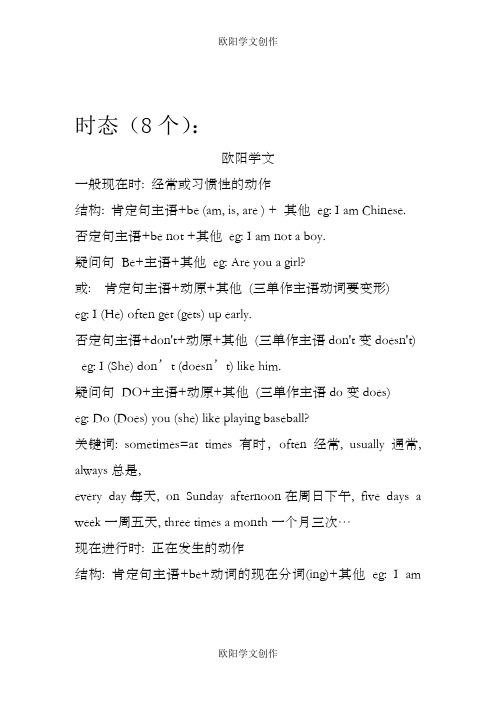
时态(8个):欧阳学文一般现在时: 经常或习惯性的动作结构: 肯定句主语+be (am, is, are ) + 其他eg: I am Chinese. 否定句主语+be not +其他eg: I am not a boy.疑问句Be+主语+其他eg: Are you a girl?或: 肯定句主语+动原+其他(三单作主语动词要变形) eg: I (He) often get (gets) up early.否定句主语+don't+动原+其他(三单作主语don't变doesn't) eg: I (She) don’t (doesn’t) like him.疑问句DO+主语+动原+其他(三单作主语do变does) eg: Do (Does) you (she) like playing baseball?关键词: sometimes=at times有时,often经常, usually通常, always总是,every day每天, on Sunday afternoon在周日下午, five days a week一周五天, three times a month一个月三次…现在进行时: 正在发生的动作结构: 肯定句主语+be+动词的现在分词(ing)+其他eg: I amreading now.否定句主语+be not+动词的现在分词(ing)+其他eg: I am not working.疑问句Be +主语+动词的现在分词+其他eg: Are you sleeping?关键词:now现在, at the moment此刻, look, listen, keep quiet等提示语.一般将来时: 将要发生的动作结构:肯定句主语+will+动词原型+其他eg: I will call you later.否定句主语+will not +动词原型+其他eg: I will not go to the park.疑问句Will +主语+动词原型+其他Will you go shopping with her?(will 可改为be going to ,当主语是第一人称时will可用shall) 关键词:tomorrow, next year明年, tonight今晚, this year今年, at the end of this term这学期期末, from now on从现在开始, soon 一会儿马上, later后稍后,in three days三天之内, in the future 未来…一般过去时: 过去发生的动作强调时间句子结构:肯定句主语+be(was,were)+其他eg: I was born on July.1st, 2000.否定句主语+be not+其他eg: I was not born in 1999.疑问句Be+主语+其他eg: Were you born in January?或: 肯定句主语+动词的过去式(ed)+其他Lily went shopping yesterday.否定句主语+did not+动原+其他eg: He did not go to school today.疑问句Did+主语+动原+其他eg:Did she pass the test?关键词:yesterday昨天,last week上周, last year去年, 一段时间+ago如ten years ago十年前five hours ago五小时前, in +年/月,on+具体日期...Just now=a moment ago刚才,in the old days从前, long ago很久以前...过去进行时: 过去正在发生的动作结构: 肯定句主语+was/were+动词的现在分词+其他eg: I was doing my homework at 8 o’clock yesterday evening.否定句主语+was/were not +动词的现在分词+其他They were not staying at home at this moment last Sunday.疑问句Was/Were + 主语+ 动词的现在分词+其他Were you sleeping when I called you last night?关键词:具体时间如:at ten o'clock yesterday morning, at this moment last Sunday上周日的这个时候...现在完成时: 过去发生的动作对现在造成的影响强调动作或其产生的结果结构:肯定句主语+have/has+动词的过去分词+其他(三单变成has)eg: This year alone, we've already planted ten thousand trees否定句主语+have/has not+动词的过去分词+其他eg: He has not arrived at home yet.疑问句Have/Has +主语+动词的过去分词+其他eg: Have you been to China?关键词:already已经, yet还, just刚刚, ever曾经, never从不,so far目前, for +一段时间,since+过去的具体时间,this year alone今年以来,these five years alone这五年以来",in the last ten years 在过去的十年中…过去将来时:结构: 肯定句主语+ would+动原+其他eg: I didn't know if he would come.否定句主语+ would not +动原+其他eg: They were not going to go hiking unless they finished their homework.疑问句Would+主语+动词原型+其他(would you like是词组一个固定搭配一般用表示礼貌的问)eg: Would you like to have a dinner with me?(would可改为was/were going to ,主语第一人称时would也可以用should)过去完成时:结构: 肯定句主语+had +动词的过去分词+其他eg: Mr. Smith died yesterday. He had been a good friend of mine. 否定句主语+had not +动词的过去分词+其他eg: He said he has not been to America.疑问句Had+主语+动词的过去分词+其他eg: Had he completed his homework by the time you got there.关键词: 句子中的两个动作都发生在过去一、一般现在时:概念:经常、反复发生的动作或行为及现在的某种状况。
中考必考八大时态之欧阳科创编
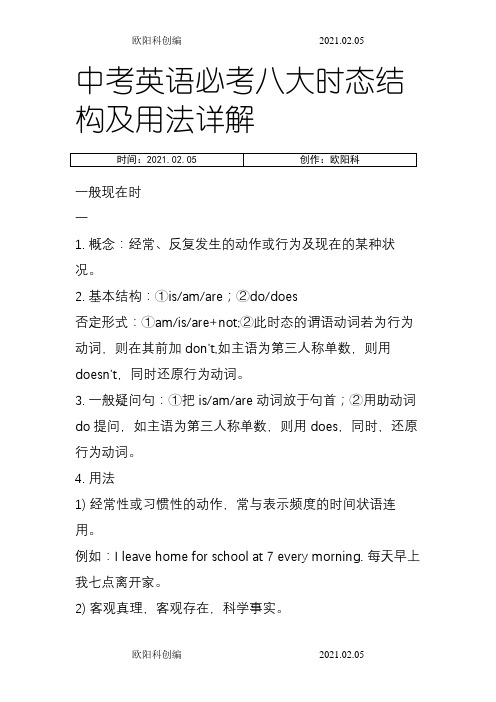
一般现在时一1. 概念:经常、反复发生的动作或行为及现在的某种状况。
2. 基本结构:①is/am/are;②do/does否定形式:①am/is/are+not;②此时态的谓语动词若为行为动词,则在其前加don't,如主语为第三人称单数,则用doesn't,同时还原行为动词。
3. 一般疑问句:①把is/am/are动词放于句首;②用助动词do提问,如主语为第三人称单数,则用does,同时,还原行为动词。
4. 用法1) 经常性或习惯性的动作,常与表示频度的时间状语连用。
例如:I leave home for school at 7 every morning. 每天早上我七点离开家。
2) 客观真理,客观存在,科学事实。
例如:The earth moves around the sun. 地球绕太阳转动。
Shanghai lies in the east ofChina. 上海位于中国东部。
3) 表示格言或警句。
例如:Pride goes before a fall. 骄者必败。
注意:此用法如果出现在宾语从句中,即使主句是过去时,从句谓语也要用一般现在时。
例如:Columbus proved that the earth is round. 哥伦布证实了地球是圆的。
4) 现在时刻的状态、能力、性格、个性。
例如:I don't want so much. 我不要那么多。
Ann writes good English but does not speak well.安英语写得不错,讲的可不行。
5) 一般现在时表示将来含义a. 下列动词come, go, arrive, leave, start, begin, return的一般现在时可以表示将来,主要用来表示在时间上已确定或安排好的事情。
例如:The train leaves at six tomorrow morning. 火车明天上午六点开。
初中英语八大时态讲解及练习(全)之欧阳术创编

一、一般现在时:概念:经常、反复发生的动作或行为及现在的某种状况。
时间状语:always, usually, often, sometimes, every week (day, year, month…), once a week, on Sundays, etc.基本结构:①be动词;②行为动词否定形式:①am/is/are+not;②此时态的谓语动词若为行为动词,则在其前加don't,如主语为第三人称单数,则用doesn't,同时还原行为动词。
一般疑问句:①把be动词放于句首;②用助动词do提问,如主语为第三人称单数,则用does,同时,还原行为动词。
在一般现在时中,当主语是第三人称单数时,谓语动词要用第三人称单数形式,即常在动词原形后加-s或-es。
一、人称代词he, she, it是第三人称单数。
如:He likes watching TV. 他喜欢看电视。
She has lunch at twelve. 她十二点吃午餐。
It looks like a cat. 它看起来像只猫。
(口诀:I用am,you用are,is用于她他它,单数名词用is,复数名词都用are)二、单个人名、地名或称呼作主语;是第三人称单数。
如:①Han Mei looks like her mother. 韩梅看起来像她的母亲。
②Beijing is in China. 北京在中国。
③Uncle Wang often makes cakes. 王叔叔经常做蛋糕。
三、单数可数名词或"this / that / the+单数可数名词"作主语时,是第三人称单数。
如:①A horse is a useful animal. 马是有用的动物。
②This book is yours. 这本书是你的。
四、不定代词someone, somebody, nobody, everything, something 等及指示代词this, that作主语时,是第三人称单数。
初中英语时态语态练习100题之欧阳歌谷创作
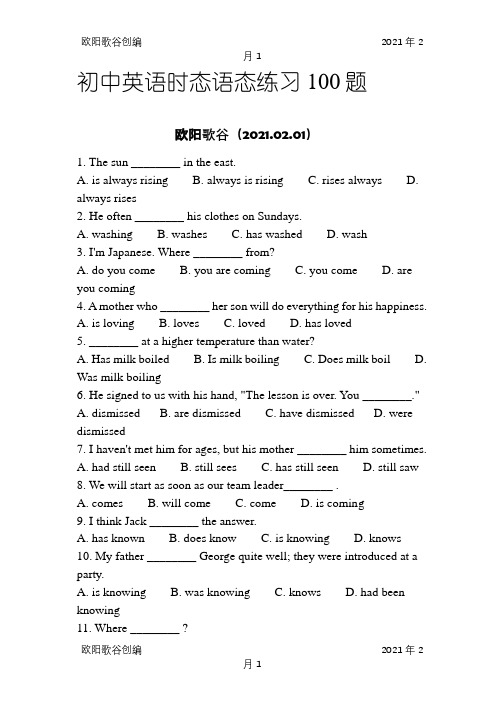
初中英语时态语态练习100题欧阳歌谷(2021.02.01)1. The sun ________ in the east.A. is always risingB. always is risingC. rises alwaysD. always rises2. He often ________ his clothes on Sundays.A. washingB. washesC. has washedD. wash3. I'm Japanese. Where ________ from?A. do you comeB. you are comingC. you comeD. are you coming4. A mother who ________ her son will do everything for his happiness.A. is lovingB. lovesC. lovedD. has loved5. ________ at a higher temperature than water?A. Has milk boiledB. Is milk boilingC. Does milk boilD. Was milk boiling6. He signed to us with his hand, "The lesson is over. You ________."A. dismissedB. are dismissedC. have dismissedD. were dismissed7. I haven't met him for ages, but his mother ________ him sometimes.A. had still seenB. still seesC. has still seenD. still saw8. We will start as soon as our team leader________ .A. comesB. will comeC. comeD. is coming9. I think Jack ________ the answer.A. has knownB. does knowC. is knowingD. knows10. My father ________ George quite well; they were introduced at a party.A. is knowingB. was knowingC. knowsD. had been knowing11. Where ________ ?A. Mary worksB. works MaryC. does Mary worksD. does Mary work12. I think this question ________ to answer.A. easyB. is easyC. was easyD. Both A and B13. ________ oil or butter when you cook it ?A. Do you useB. Did you useC. Were you usingD. Have you used14. I ________ some newspaper at seven yesterday evening.A. am readingB. readC. was readingD. will read15. Now he ________ a book about New York. I don't think he will finish it.A. writesB. wroteC. has writtenD. is writing16. Zhang Hua does a lot of housework every evening, but now he________ his schoolmates with their lessons.A. helpB. is helpingC. helpsD. has helped17. Mother washes the girl's hair. Look, she ________ .A. is washing it nowB. washes itC. is washing them nowD. washes them now18. He usually listens to the radio, but at the present moment he________ television.A. watchesB. is watchingC. has watchedD. had watched19. How long ago ________ playing with soldiers?A. have you stoppedB. had you stoppedC. did you stopD. do you stop20. Look at John! What ________ ?A. does heB. he is doingC. is he doingD. does he do21. It ________ hard when I left my house.A. is rainingB. rainsC. was rainingD. will rain22.The railway ________ in three years.A. is completeB. will completedC. has completedD. will be completed23. Don't talk so loudly. Your father ________ .A. sleepsB. is sleepingC. sleptD. had slept24. ----- What are you doing under the table?----- I ________ to find my pen.A. triedB. had triedC. tryD. am trying25. Jane and Tom ________ the door.A. are walking atB. walk atC. walks toD. are walking to26. How many people does the doctor know ________ of the disease?A. are dyingB. is dyingC. has diedD. dies27. He ________ thin.A. was gettingB. is gettingC. will gettingD. had been got28. Our team ________ every match so far this year, but we still have three games to play.A. was winningB. has wonC. had wonD. wins29. I shall tell you what he ____at three o'clock yesterday afternoon.A. has doneB. has been doneC. had been doingD. was doing30. I ________ my homework now.A. finishB. finishedC. have finishedD. had finished31. I ________ this coat for very long. It still looks quite new.A. wasn't havingB. haven't hadC. hadn'tD. haven't been having32. ________ reading the book yet?A. Have you finishedB. Were you finishingC. Had you finishedD. Are you finishing33. The evening party ________ .You are a little late.A. just beganB. just has begunC. has just begunD. has begun just now34. The dog is still wet. It ________ out of the rain.A. only just comesB. has only just comingC. was only just comeD. has only just come35. Where did you study before you ________ to this middle school?A. comeB. cameC. are comingD. will come36. He ________ home for nearly three weeks.A. has gone away fromB. has leftC. has been away fromD. went away from37. ----- Did your brother go to America last year? ----- ________ .A. No, he has never go thereB. No, he has never gone hereC. No, he never was thereD. No, he's never been there38. My uncle ________ in that factory since 1958.A. workedB. had workedC. is workingD. has worked39. I ________ her since she was a little girl.A. knewB. knowC. had knownD. have known40. He ________ for three years.A. has joinedB. has been in the armyC. joinedD. has served the army41. His grandfather ________ for thirty years.A. diedB. was deadC. has been deadD. has died42. I ________ a college student for more than a year.A. becameB. have becomeC. wasD. have been43. I ________ this radio for two years.A. usedB. useC. have usedD. am used44. I ________ from my brother for a long time.A. not have heardB. have not heardC. have heard notD. do not hear45. Since you don't want to go, I ________ alone.A. will goB. goC. wentD. have gone46. He________ his watch. Have you seen it anywhere?A. lostB. loseC. has lostD. had lost47. I ________ the exhibition on the life and work of Lenin.A. seeB. sawC. have seenD. am seeing48. When I was a little boy my father ________ me the earth is round.A. tellsB. has toldC. had toldD. told49. You ________ your homework..A. haven't doneB. have doingC. have not doingD. not done50. Our teacher ________ to Beijing three times.A. wentB. had doneC. has goneD. has been51. It's time you ________ a holiday.A. hadB. haveC. will haveD. have had52. The young engineer he ________ is a friend of his.A. is talkingB. is going to talkC. talkedD. is talking to53. He ________ in Shanghai in 196o.A. livesB. livedC. has livedD. is living54. Robert ________ in England a few weeks ago.A. arrivesB. has arrivedC. could arriveD. arrived55. How long ago ________ in Fujian?A. has he arrivedB. did he arriveC. could he arriveD. arrived56. Jack ________ a letter to his parents last night.A. writesB. wroteC. writeD. has written57. His parent did not know why ________ his homework.A. did he not doB. did he not to doC. he had not doneD. he had done not58. Last week John ________ his leg.A. felt and brokenB. fell and brokeC. feels and breaksD. fallen and broken59. Wang Jinsi ________ the whole nation as Iron Man.A. was known byB. is known toC. knewD. has known60. They ________ to a new house last month.A. movesB. moveC. movedD. have moved61. I'll let you know as soon as he ________ .A. arrivesB. will arriveC. arriveD. reach62. ________ last year and is now earning his living as a newsboy.A. He left the schoolB. He has left the schoolC. He had left schoolD. He left school63. Mike is now in New York. He ________ there since six days ago.A. wasB. isC. had beenD. has been64. Yesterday Mary ________ to me with a problem.A. cameB. goesC. wentD. come65. Where ________ yesterday?A. went youB. was youC. have you beenD. were you66. Yesterday a man ________ my car.A. hiteB. hatC. hittedD. hit67. The sun ________ when we got there.A. raisedB. had raisedC. had risenD. rises68. When did you ________ to see me last?A. goB. wentC. cameD. come69. ________ the news last night?A. Heard youB. Did you heardC. Did you hearD. Were you hear70. This book ________ everybody.A. is known byB. is known forC. is known toD. knows71. I am sure he'll come to see me before he ________ Beijing.A. leaveB. leftC. will leaveD. leaves72. Jack ________ his thick coat because it was snowing.A. puts onB. put onC. takes onD. took on73. He ________ his coat and went out.A. takes onB. put onC. takes onD. took on74. How many people ________ the lecture on basic chemistry?A. attendedB. is attendingC. do they attendD. did attend75. Look at the clock! It's time ________ home.A. we'll goB. we wentC. we're goingD. we should go76. He ________ you later.A. will seeB. may will seeC. wills seeD. will sees77. ________ breakfast in the morning?A. Will she beB. Will she cooksC. Will she cookD. Will she be cook78. You ________ her again in a few days.A. will seeB. have seenC. had seenD. have been seen79. My parents ________ me to become a doctor.A. hopedB. wantedC. decidedD. suggested80. If we study hard, ________ .A. we had passed the examB. We are passing the examC. we have passed the examD. we will pass the exam81. She has been here ________ .A. after 1978B. for 1978C. in 1978D. since 197882. Your shirt is dirty. ________ it for you?A. Am I going to washB. Will I washC. Am I washingD. shall I wash83. ----- The clock is slow.----- It isn't slow, it ________ .A. is stoppingB. will stopC. has stoppedD. stopped84.They wanted to know when they ________ have an examination.A. had gone toB. were going toC. would be goingD. had been going85. My sister ________ to see me. She'll be here soon.A. comesB. is comingC. had comeD. came86. When ________ , I'll talk to him.A. does Peter comeB. Peter will comeC. Peter comesD. can Peter come87. He will pay a visit to the exhibition when he ________ time.A. hasB. will haveC. hasD. is going to have88. I will go home for the vacation as soon as I ________ my exams.A. will finishB. finishC. finishingD. finished89. If ________ , we'll stay at home.A. it will rainB. it's to rainC. it rainsD. it'll be raining90. It ________ hard when we left.A. is rainingB. has rainedC. was rainingD. rained91. What ________ when I saw you yesterday?A. did you doB. were you doingC. you were doingD. you did92. Bill said that he ________ his homework at half past seven yesterday evening.A. didB. was doingC. will doD. has done93. They ________ a meeting from 2 to 4 yesterday afternoon.A. were havingB. hadC. would haveD. have94. Yesterday afternoon some students ________ wheat on the farm.A. had sowingB. sowedC. have sownD. were sowing95. She ________ at seven o'clock this morning.A. is writingB. writeC. writesD. was writing96. By the end of last term we ________ English for two years.A. have studiedB. have been studiedC. would studiedD. had studied97. He ________ quite a lot in his work.A. use to travelB. is used to travelC. used to travelD. was used to travel98. He ________ out when somebody called at his office.A. has just goneB. had just goneC. just wentD. just now went99. When the teacher came into the classroom, the pupils ________ their exercises.A. have doneB. were doingC. are doingD. has done 100. When we arrived, the dinner ________ .A. already beganB. has already begunC. had already begunD. was just begun1. D2. B3. A4. B5. C6. B7. B8. A9. D 10. C 11. D 12. D 13. A 14. C 15. D 16. B 17. A 18. B 19. C 20. C 21. C 22. D 23. B 24. D 25. D 26. A 27. B 28. B 29. D 30. C 31. B 32. A 33. C 34. D 35. B 36. C 37. D 38. D 39. D 40. B 41. C 42. D 43. C 44. B 45. A 46. C 47. C 48. D 49. A 50. D51. A 52. D 53. B 54. D 55. B 56. B 57. C 58. B 59. B 60. C 61. A 62. D 63. D 64. A 65. D 66. D 67. C 68. D 69. C 70. C 71. D 72. B 73. B 74. A 75. B 76. A 77. C 78. A 79. B 80. D 81. D 82. D 83. C 84. B 85. B 86. C 87. A 88. B 89. C 90. C 91. B 92. B 93. A 94. D 95. D 96. D 97. C 98. B 99. B 100C。
一般现在时态句型结构之欧阳歌谷创作

一般现在时态
欧阳歌谷(2021.02.01)
一、定义表示经常或习惯性发生的动作或存在的状态
常与表示频率的副词sometimes(有时), often(经常), usually(通常), always(总是),once a week.以及时间状语in the morning/ afternoon/ evening(在上午/下午/晚上), every day/ week/ month/ year (每天/周/月/年, at noon/night(在中午/夜里), on Monday/Tuesday(在星期一/二)等连用。
He gets up at six o’clock every day.I like English.He is a good student.
二、句型结构
欧阳歌谷创编 2021年2月1
三、动变规则:
1、一般在动词加s。
如:talk –talks, live –lives。
2、以s, x, ch, sh或o结尾的动词加es。
如:guess-guesses,mix-mixes,watch –watches, wash –washes, go –goes,do–does
3、以辅音字母加y结尾的动词,把y变成i再加es。
如:study--studiesfly –flies。
4、特殊have的第三人称单数为has。
be的第三人称单数为 is
欧阳歌谷创编 2021年2月1。
初中英语语法归纳(一般将来时)之欧阳歌谷创作

初中英语语法归纳:一般将来时欧阳歌谷(2021.02.01)英语语法一般将来时表示将来某个时间要发生的动作,事情或存在的状态,也表示将来经常或反复发生的动作或事情。
那么,英语一般将来时的句子结构和语法特点是怎样的呢?下面为您讲解一下。
1)will/shall+动词原形shall用于第一人称,常被will 所代替。
will 在陈述句中用于各人称,在征求意见时常用于第二人称。
will not=won't shall not=shan't例如:Which paragraph shall I read first? 我先读哪一段呢?Will you be at home at seven this evening? 今晚七点回家好吗?2) be going to +不定式,表示将来。
a. 主语的意图,即将做某事。
例如:What are you going to do tomorrow? 明天打算作什么呢?b. 计划,安排要发生的事。
例如:The play is going to be produced next month。
这出戏下月开播。
c. 有迹象要发生的事。
例如:Look at the dark clouds, there is going to be a storm. 看那乌云,快要下雨了。
3) be +不定式表将来,按计划或正式安排将发生的事。
例如:欧阳歌谷创编2021年2月We are to discuss the report next Saturday.我们下星期六讨论这份报告。
4) be about to +不定式,意为马上做某事。
例如:He is about to leave for Beijing. 他马上要去北京。
注意:be about to do 不能与tomorrow, next week 等表示明确将来时的时间状语连用。
Notice:be to和be going tobe to 表示客观安排或受人指示而做某事,be going to 表示主观的打算或计划。
英语中的十六种时态之欧阳歌谷创编
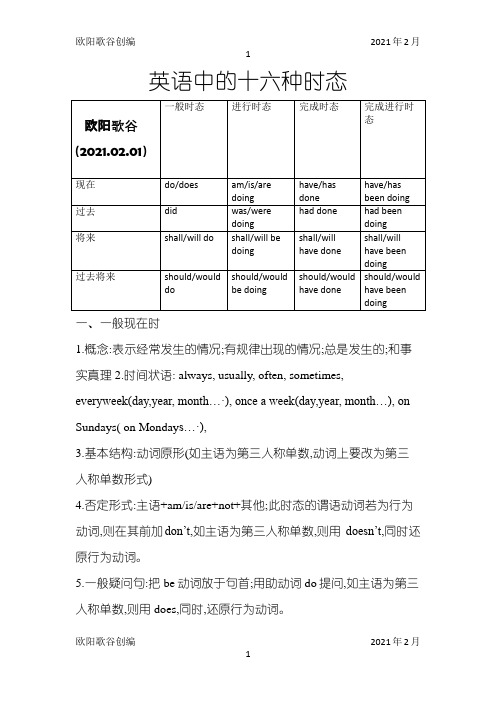
英语中的十六种时态一、一般现在时1.概念:表示经常发生的情况;有规律出现的情况;总是发生的;和事实真理2.时间状语: always, usually, often, sometimes,everyweek(day,year, month…·), once a week(day,year, month…), on Sundays( on Monday s…·),3.基本结构:动词原形(如主语为第三人称单数,动词上要改为第三人称单数形式)4.否定形式:主语+am/is/are+not+其他;此时态的谓语动词若为行为动词,则在其前加don’t,如主语为第三人称单数,则用doesn’t,同时还原行为动词。
5.一般疑问句:把be动词放于句首;用助动词do提问,如主语为第三人称单数,则用does,同时,还原行为动词。
6.例句: It seldom snows here.这里很少下雪。
He is always ready to help others.他总是乐于帮助别人Action speaks louder than words.事实胜于雄辩二、一般过去时1.概念:过去某个时间里发生的动作或状态;过去习惯性、经常性的动作、行为。
2.时间状语:ago, yesterday, the day before yesterday, last week , last year , night , month . ) , in 1 9 8 9 , just now at the age of 5 , one day , long long ago , once upon a time3.基本结构:主语+动词的过去式或be的过去式+名词4.否定形式:主语+was/were+not+其他;在行为动词前加didn’'t,同时还原行为动词。
5.一般疑问句:was或were放于句首;用助动词do的过去式did提问,同时还原行为动词。
《英语语法大全(完全版)之欧阳歌谷创作
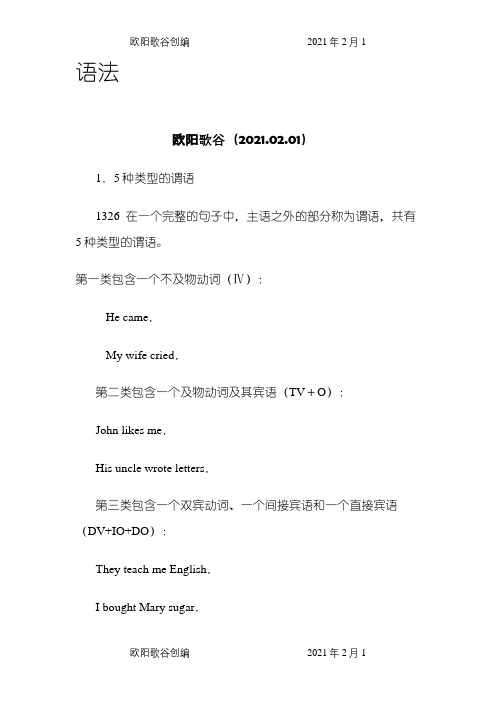
语法欧阳歌谷(2021.02.01)1.5种类型的谓语1326 在一个完整的句子中,主语之外的部分称为谓语,共有5种类型的谓语。
第一类包含一个不及物动词(Ⅳ):He came.My wife cried.第二类包含一个及物动词及其宾语(TV+O):John likes me.His uncle wrote letters.第三类包含一个双宾动词、一个间接宾语和一个直接宾语(DV+IO+DO):They teach me English.I bought Mary sugar.第四类包含一个系动词及主语补语(LV+C):He is a teacher.She looks sad.第五类包含一个宾补动词、宾语及宾语补语(FV+O+C):We made him king.She left the house dirty.1.基本成分1302 根据其结构,句子可以分为5类:a.主语+不及物动词John came.(S)(IV)b.主语+及物动词+宾语John likes oranges.(S)(TV)(O)c.主语+双宾动词+间接宾语+直接宾语John gave Mary books.(S)(DV)(IO)(DO)d.主语+系动词+主语补语John is happy.(S)(LV)(SC)e.主语+宾补动词+宾语+宾语补语John makes Mary angry.(S)(FV)(O)(OC)主语、不及物动词、及物动词、双宾动词、系动词、宾补动词、宾语及补语可以称为基本句子成分。
在上面的句子中,如把任何一个成分删除,都会成为病句。
从上面例句也可看出,完整的句子一般至少包含2个基本成分,至多4个基本成分。
2.附属成分1303 基本成分可以加修饰语:1)定语(即用来修饰名词的单词、短语或从句)或2)状语(即用来修饰名词或代词以外的词的单词、短语或从句)。
下面例句中,修饰语为斜体字,被修饰的词为黑体字:1)Poor John tottered toward a hospital nearby.John likes oranges imported from the U.S..John gave Mary many books,which are full of illustrations.2)John often came to chat with me.John likes oranges very much.Whenever he gets drunk,John makes Mary very angry.这类句子,即使把修饰语去掉,结构仍是完整的。
宾语从句用法及其例句之欧阳音创编
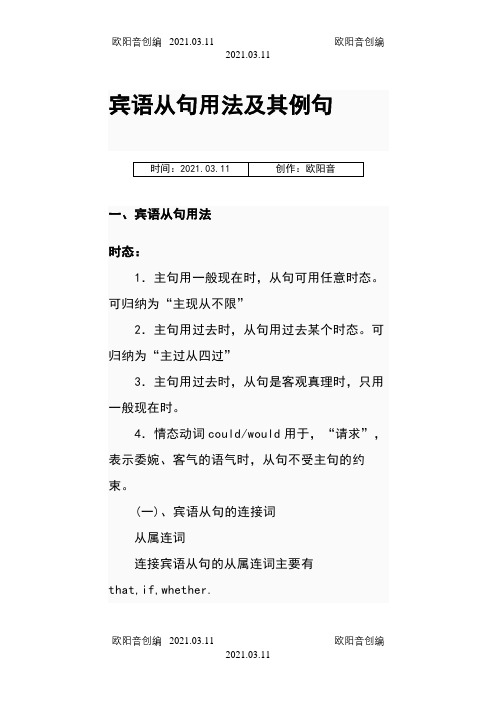
宾语从句用法及其例句一、宾语从句用法时态:1.主句用一般现在时,从句可用任意时态。
可归纳为“主现从不限”2.主句用过去时,从句用过去某个时态。
可归纳为“主过从四过”3.主句用过去时,从句是客观真理时,只用一般现在时。
4.情态动词could/would用于,“请求”,表示委婉、客气的语气时,从句不受主句的约束。
(一)、宾语从句的连接词从属连词连接宾语从句的从属连词主要有that,if,whether.that引导表示陈述句的宾语从句,if和whether,whether...or not引导表示“是否”的一般疑问句的宾语从句.He told me (that )he would go to college the next year他告诉我他明年上大学.I don’t know if there will be a bus any more.我不知道是否还会有公交车.Nobody knew whether he could pass the exam.没有人知道他是否会通过考试.(二)连接代词连接代词主要有who,whom,whose,what,whoever,whomever,whose ver,whatever,whichever等.连接代词一般指疑问,但what,whatever除了指疑问外,也可以指陈述.Do you know who has won Red Alert game 你知道是谁赢得了红色警戒的游戏么?The book will show you what the best CEOs should know.这本书会告诉你最好的执行总裁该了解什么.Have you determined whichever you should buy,a Motorola or Nokia cell phone 你决定好是买诺基亚还是摩托罗拉的电话了吗(三)连接副词连接副词主要有when,where,why,how,whenever,wherever,howev er等.He didn’t tell me when we should meet again.他没有告诉我什么时候我们能再见面.Could you please tell me how you use the new panel你能告诉我怎么用这个新的操作盘吗None of us knows where these new parts can be bought.没有人知道这些的新的零件能在哪里买到.二、动词的宾语从句大多数动词都可以带宾语从句We all expect (that )they willwin,for members of their team are stronger.我们都预料他们会赢,因为他们的队员更强壮.He told us (that) they would help us through the whole work.他告诉我们在整个工作中,他们都会帮忙的.部分“动词+副词”结构也可以带宾语从句I have found out (that) all thetickets for the concert have been sold out.我发现这场音乐会的所有票都卖光了.Can you work out (that)how much wewill spend during the trip你能计算出这次旅行我们将花费多少钱吗动词短语也可以带宾语从句常见的这些词有:make sure确保make up one’s mind下决心 keep in mind牢记Make sure that there are no mistakes in your papers before you turn them in.当你在上交试卷前确保没有任何错误.可运用形式宾语it代替的宾语从句①动词find,feel,consider,make,believe 等后面有宾语补足语的时候,则需要用it做形式宾语而将that宾语从句后置.I think it necessary that we take plenty of hot water every day .我认为每天多喝开水是有必要的.I feel it a pity that I haven’t been to the get-together.我没去聚会,感觉非常遗憾.I have made it a rule that I keep diaries.我每天写日记成了习惯.We all find it important that we (should) make a quick decision about this matter.我们都认为对这件事马上做出决定很重要.②有些动词带宾语从句时需要在宾语与从句前加it这类动词主要有:hate,take,owe,have,see to.I hate it when they say with their mouths full of food.我讨厌他们满嘴食物时说话.He will have it that our plan isreally practical.他会认为我们的计划确实可行.We take it that you will agree with us.我们认为你会同意我们的.When you start the engine,you must see to it that car is in neutral.开启发动机时,一定要使汽车的离合器处于空挡位置.③若宾语从句是wh-类,则不可用it代替We all consider what you said to be unbelievable.我们都认为你所说的是不可信的.We discovered what we had learned tobe valuable.我们发现我们所学到的东西都是有价值的. 三、介词的宾语从句用wh-类的介词宾语从句:We are talking about whether we admit students into our club.我们正在讨论是否让学生加入我们的俱乐部.The new book is about how Shenzhou 6 manned spaceship was sent up into space.这本新书是关于神州6号载人航天飞船是如何升入太空的.用that,if引导的介词宾语从句有时候except,but,besides三个介词后可见到that引导的宾语从句I know nothing about my new neighbor except that he used to work with a company.对于我的新邻居我只知道他曾在一家公司上班,其他一无所知.四、形容词的宾语从句常用来引导宾语从句的形容词有:sure,certain,glad,please,happy,sorry,afrai d,satisfied,surprisedI am sure I will pass the exam.我确信我会通过考试.I am sorry that I have troubled you so long.很抱歉我这么长时间在打扰你.He is glad that Li Ming went to see him when he was ill.他很高兴在他生病的时候李明能去看望他.五、if,whether在宾语从句中的区别① if和whether在作“是否”解时,引导宾语从句常放在动词know,ask,care,wonder,find out等之后,介词后一般不用if② 少数动词,如:leave,put,discuss,doubt后的宾语从句常用whether.③ whether后可以加or not,但是if不可以.④ 在不定式前只能用whether.(如:I can’t decide whether to stay. 我不能决定是否留下。
初中英语八种时态归纳一览表之欧阳地创编
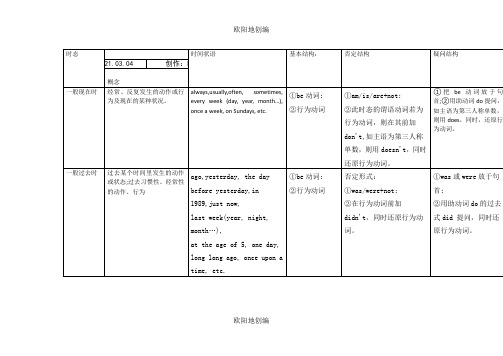
②行为动词
否定形式:①was/were+not;
②在行为动词前加didn't,同时还原行为动词。
①was或were放于句首;
②用助动词do的过去式did 提问,同时还原行为动词。
现在进行时
表示现阶段或说话时正在进行的动作及行为
now, atthis time, these days, etc
had放于句首
一般将来时
表示将要发生的动作或存在的状态及打算、计划或准备做某事
tomorrow,next day(week, month, year…),soon, in a few minutes, by…,the day after+
going to + do;
have/has+ not +done.
have或has放于句首
过去完成时
以过去某个时间为标准,在此以前发生的动作或行为,或在过去某动作之前完成的行为,即“过去的过去”。
before,
by the end of last year(term, month…),etc.
had +done
had + not+ done
①be动词;
②行为动词
①am/is/are+not;
②此时态的谓语动词若为行为动词,则在其前加don't,如主语为第三人称单数,则用doesn't,同时还原行为动词。
①把be动词放于句首;②用助动词do提问,如主语为第三人称单数,则用does,同时,还原行为动词。
一般过去时
过去某个时间里发生的动作或状态;过去习惯性、经常性的动作、行为
ago,yesterday, the day before yesterday,in 1989,just now,
- 1、下载文档前请自行甄别文档内容的完整性,平台不提供额外的编辑、内容补充、找答案等附加服务。
- 2、"仅部分预览"的文档,不可在线预览部分如存在完整性等问题,可反馈申请退款(可完整预览的文档不适用该条件!)。
- 3、如文档侵犯您的权益,请联系客服反馈,我们会尽快为您处理(人工客服工作时间:9:00-18:30)。
中英语语法大全:8大时态和3大从
欧阳歌谷(2021.02.01)
语法部分是英语学习的重点和难点。
语法知识掌握得好,将大大加快英语学习的进程。
而语法的八种基本时态和含有不复杂的状语从句、定语从句及宾语从句的复合句是初中生学习的重点也是语法学习的难点。
之前我们总结了重点的一些词法内容,今天有整理了了八种基本时态以及初中生需要掌握三种基本从句。
希望对广大中学生们有所帮助。
八种基本时态
1. 一般现在时
概念: 表示经常发生的动作或经常存在的状态。
常和always , often , usually , sometimes , every day 等表时间的状语连用。
如:1) I go to school every day . 我每天都去学校。
(表经常)
2) He is always like that . 他总是那样。
(表状态)
构成:
1) 主语+ be (am / are / is ) +……
2) 主语+ 实义动词/三单动词+ …
2.一般过去时
概念:
1) 表示过去某个时间发生的动作或存在的状态.
常和表示过去的时间状语连用. 如: yesterday , last week , in 1998 , two days ago等.
如: I went to a movie yesterday. 我昨天去看了一场电影.
2) 也可表示过去经常或反复发生的动作.
如He always went to work by bike last week.
构成:
1) 主语+ be (was / were ) +……
2) 主语+ 实义动词过去式+
3. 现在进行时
概念: 表示现在(说话瞬间)正在进行或发生的动作.
如: He is singing.
They are watching TV now.
构成:主语+ 助动词be(am/are/is) + 动词-ing形式构成.
4. 过去进行时
概念: 表示过去某一时刻或某一段时间正在进行的动作. 这一特定的过去时间除了有上下文暗示外,一般用时间状语来表示.
如: 1) ---What were you doing?
---I was jumping.
2) ---What was the boy doing when the UFO arrived?
---He was sleeping.
构成:主语+ 助动词be(was/were) + 动词-ing形式构成.
5. 一般将来时
概念: 表示将来某个时间要发生的动作或存在的状态,也表示将来经常或反复发生的动作,常与表示将来的时间状语连用,如: tomorrow, next week, next year, in the future等.
如: He will go shopping tomorrow.
They are going to play basketball next week.
构成:
1) 主语+ 助动词will + 动原+…
2) 主语+ be going to + 动原+ ….
6. 过去将来时
概念: 表示在过去将来的某一时间发生的动作或存在的状态.
构成:
1) 主语(第一人称) + 助动词should + 动原+…
2) 主语+ would + 动原+ ….
3) 主语+ was/ were going to +动原…
用法:
过去将来时除了上下文暗示外,一般常用在间接引语中,主句谓语动词为过去时态.
如: 1) I should go.
2) You knew I would come.
3) They were going to Naning.
7. 现在完成时
构成: 主语+ 助动词( have / has ) + 动词过去分词+…
表示过去发生或已经完成的动作对现在造成的影响或结果.
---Have you had your lunch yet?
---Yes, I have. (现在我不饿了)
8. 过去完成时
构成:主语+ 助动词had + 动词过去分词+…
表示过去在过去某一时间或动作之前已经发生或完成了的动作.它表示的动作发生的时间是”过去的过去”.表示过去某一时间可用by, before 等构成的短语,也可用when, before, 等引导的从句或者通过上下文表示.
I had finished my homework when my mom came back home.
三种基本从句
从句的共同特点
从句是指在一个句子中充当一个成分的句子,充当什么成分就叫什么从句,如:充当宾语就叫宾语从句,充当定语成分就叫定语从句。
从以上定义中我们可以得出关于从句的一个最大特点:从句是句子。
从句的共同特点:1.从句都有自己的连接词2.从句都是陈述语序
(陈述语序就是主语在前,谓语在后,如:He is a teacher主语He 在谓语is之前,因此是陈述语序,而Is he a teacher? 主语He 在谓语is之后,因此不是陈述语序。
)
1. 宾语从句
宾语从句是指在一个句子中充当宾语的句子,如:He said that he wanted to be a teacher when he grew up.
宾语从句的特点:
①宾语从句有自己的连接词
②宾语从句用陈述语序
③宾语从句的时态
(1)宾语从句的连接词:
宾语从句的连接词包括that、if/whether(是否)、特殊疑问词。
(2)宾语从句的语序:
A. 宾语从句的连接词后加陈述语序(主语在前,谓语在后),如:I want to know if he can come tomorrow
B. 当连接词本身又是宾语从句的主语时,后面直接加谓语动词,如:She asked me who had helped him.
(3)宾语从句的时态
只要记住以下口诀就可以了“主现则从任,主过则从过,客观真理一般现”
A. 主现则从任:主句如果是一般现在时,则从句根据时间状语需要从八种时态中任选一种,如:1.He tells me he likes English very
much(一般现在时)
B. 主过则从过:主句如果是一般过去时,则从句根据时间状语需要从四种带“过”字的时态中任选一种,带“过”字的时态分别是如:一般过去时,过去进行时,过去将来时,过去完成时。
如:He told me that he liked playing football(一般过去时)
C. 客观真理一般现:客观真理永远用一般现在时。
如:1.He says the moon goes around the earth.
2. 状语从句
(1)时间状语从句:在一个句子中作时间状语的句子。
时间状语的连接词:when(当…时候) while(当…时候) as(当…时候) after(在…以后) before(在…以前) as soon as(一…就) since(自从…到现在) till /until(直到…才) by the time(到…为止)依旧是连接词后加陈述语序。
举例:when当…的时候(一般情况下主句是将来时的时候,从句要用一般现在时。
)
Mozart started writing music when he was four years old.
(2)原因状语从句:在一个句子中作原因状语的句子。
连接词:由连词because, since, as引导, 也可由for, now that 等词引导。
举例:I didn’t go to school yesterday because I was ill.
(3)条件状语从句:在一个句子中作条件状语的句子。
连接词:if如果, unless (=if not) 除非。
(让步)
举例:If it doesn’t rain tomorrow, we will go hiking.
(4)目的、结果状语从句
目的状语从句是指在一个句子中充当目的状语的句子。
结果状语从句是指在一个句子中充当结果状语的句子
目的状语从句连接词so that, so…that , in order that 引导。
结果状语从句连接词so…that, such…that, so much/many…that引导。
举例:so…that 如此…以至于
The scientist’s report was so instructive that we were all very excited.(5)让步状语从句
让步状语从句是指在句子中作让步的状语的句子
连接词:though, although.,whether…or not
举例:Although he is rich, yet he is not happy.
3. 定语从句
定语是指在句子中用来修饰名词、代词的成分。
如:I will give my teacher a bunch of beautiful flower.(中beautiful就是定语)
定语从句是指在一个句子中作定语的句子,定语从句要放在所修饰的词后。
如:I have met the doctor who is in the No.1 hospital.
定语从句的连接词:
连接代词:who、which、whom、whose、that
连接副词:when、where、why。
